U bent hier
Internet Archive
Scanning periodicals for patrons with print disabilities
The Internet Archive has increased periodical digitization of purchased and donated print and microfilm resources to enhance our services for our patrons with print disabilities. Those patrons can receive priority access to the collections, bypassing waitlists and borrowing materials for longer circulation periods. These periodicals will also be made available to the EMMA and ACE projects to support student success. Some of these materials are also available to researchers via interlibrary loan, digital humanities research, and other ways.
The Internet Archive has a longstanding program serving patrons with print disabilities. The modern library materials that we digitize are first made available to qualified patrons, including affiliated users from the National Library Service, Bookshare, and ACE Portal. For more than ten years, thousands of patrons have signed up through our qualifying program to receive special access to the digital books available in our collection.
Organizations can sign up for free to be a Qualifying Authority to be able to authorize patrons, and individual patrons can sign up.
Our patrons share inspiring stories with us about the impacts of the service. Pastor Doug Wilson said it’s been a “profound gift” to discover books in our digital theology collections. The breadth of materials is also compelling. “You never know what you will come across. You can search for something specific, but also just wander the virtual shelves,” said musician and graduate student Matthew Shifrin. In addition to serving our own patrons, we partner with the EMMA and ACE projects, which support students with print disabilities at schools across the US and Canada.
We have resources online to help you learn more about the Internet Archive’s program for patrons with print disabilities, including how to qualify. Please contact our Patron Services team with additional inquiries.
Thank you to the Mellon Foundation, the Institute of Museum & Library Services, the Arcadia Fund, the Kahle/Austin Foundation, and donors for their support of these services.
The post Scanning periodicals for patrons with print disabilities appeared first on Internet Archive Blogs.
International patrons speak out: “Access to knowledge shouldn’t be for the rich and privileged.”
Last fall, we invited you to tell us how you are using the digitized books we make available through our lending library. The response was overwhelming, and gave us exactly the kinds of testimonials and messages of support we were hoping to gather.
As we worked through the responses, we were struck by the number of patrons from all over the world who use our collection. Here now, we’d like to share some of the powerful stories we received from our international users.
If you haven’t already done so, please share your story.
Editorial note: Statements have been edited for clarity.
Lisa M., Educator, England – “Internet Archive helped me help a student! I have students in one class that attend from around the globe. One student was unable to find the required texts and our university did not have digital copies that could be lent. If she were to order the book – not carried in any local stores – it could take up to 3 months for them to arrive, long after the course was over!”
Claudia G., Researcher, Romania – “Even before the pandemic, depending on the topic of my essay and thesis, it was difficult to find books on certain topics in local libraries or bookstores…Access to knowledge shouldn’t be for the rich and privileged.”
Ana S., Communications assistant, Brazil – “I borrowed a book about Stephen Sondheim. Sondheim’s story and body of work is definitely an inspiration for me as someone always trying to learn ways to exercise my creativity. I just wanted to browse one section, and it was really amazing. I’m really thankful you had it available, for anyone in the world, and the borrowing process was really easy to follow through.”
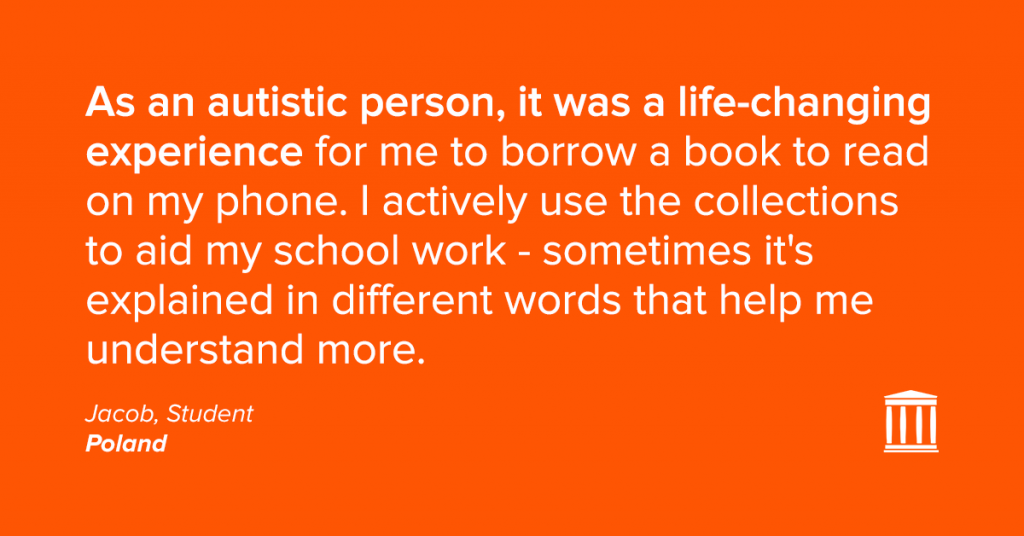
Mike D., Librarian, New Zealand – “I’m a Digital Librarian in a public library in the small town of Hokitika, New Zealand, whose job is making local history more accessible to the community – many of the New Zealand history works in our public library collection are rare or reference-only. It turns out many works of New Zealand history have been digitised by the Internet Archive from US collections”
Callum H., Yard operative, Scotland – “As a non-academic with interests in literature, history, and philosophy, the IA gives me access to books I can’t otherwise afford or access.”
Yuri L., Educator, Brazil – “I spent months of 2020 bed-ridden, and was able to view items from your digitized collection. I would not have been able to go to any physical place for my books, and the titles I was looking for were sometimes available only on the Internet Archive. There are no other means for me, in my part of South America, to have access to limited-circulation ancient newspapers of other continents without digitizing and digital libraries. Without the Internet Archive and other libraries like it, I would have no alternatives.”
Simay K., Researcher, Turkey – “Living in a developing country with so many political and economic turmoils, I believe that the Internet Archive provides a huge service and a unique platform for dissolving the injustice and inequality of [access] to knowledge between disadvantaged countries and classes.”
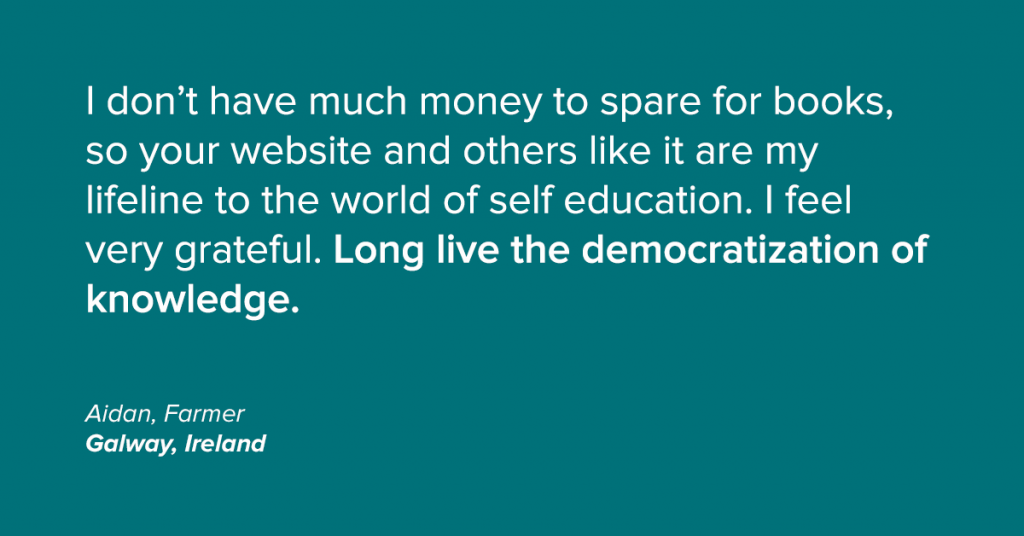
Lydia S., Student, Canada – “I’ve used materials from the Internet Archive many times throughout my time as an undergrad studying history…There are many primary and secondary sources on the IA that I was unable to find anywhere else online or in physical copies through my university’s library. Many of the books I’ve accessed through the IA have been out of print for many years, so it’s incredibly helpful to have [access] to titles that would otherwise be nearly impossible to track down.“
Kim C., Librarian, Canada – “I use the materials on the Internet Archive often on a personal and a professional level. I have been able to help patrons access books that we have not been able to procure for them in other ways, for reference material for every school level from primary to masters degree research. I have used the collection on many occasions to access local history or genealogical material unavailable elsewhere.”
Richard G., Poet, Canada – Richard used books within the Internet Archive’s library, “to reference other author’s prose and poetry for quotations and references.”
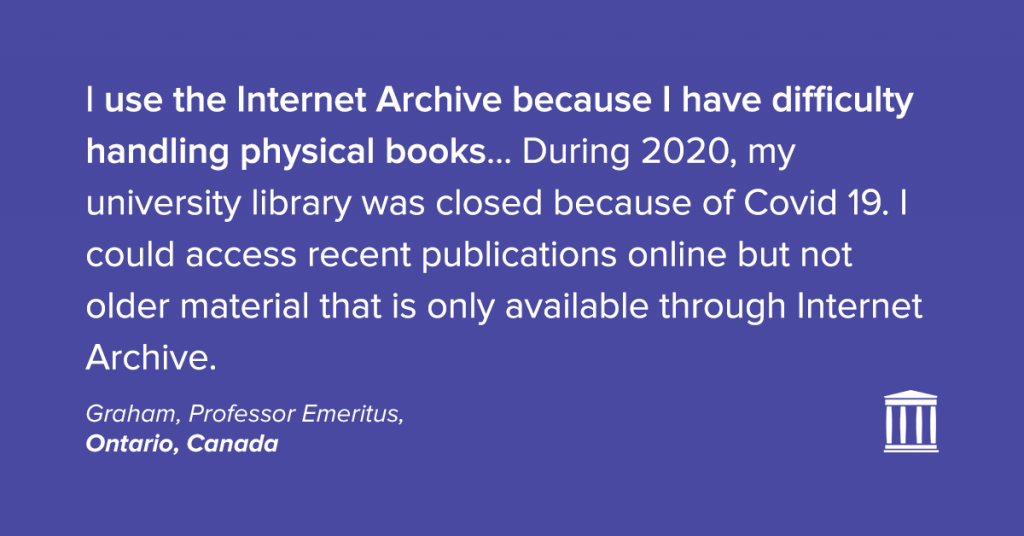
Chloe J., Student, Canada – “It has given me access to material that I would not otherwise have access to.”
Shehroze A., Educator, Pakistan – “I am surprised that books pertaining to learning the Urdu language are available on archive.org, and those which were used for preparation in the civil services. These books are just not available in the country anymore and are immeasurably useful as far as the history of the colonized area is concerned. These are not published anymore, and finding a copy is exceedingly rare. This is why archive.org is important and we should endorse and support it.”
Stephen C., Graduate student, Canada – “The Internet Archive has been an invaluable resource for a research project I am involved in. We have been able to access numerous historical travel narratives that are essential for our project. We have been able to view books that we could not access in archives due to travel restrictions and lending policies during the pandemic.”
Simon H., Printing press operator, Switzerland – “I often find interest in old and niche books, sometimes from parts of the world far away from me. In those cases, I have two options for accessing such a book:
1. I order a physical copy of the work and let it ship to my home. That is incredibly expensive, harmful to the environment and occasionally damaging to an old and fragile book, conserved for such a long time with care and passion.
2. I’m lucky enough to find a digital reproduction of a work, which can be accessed for free and “shipped” eco-friendly through wires and antennas.
The difference between those two possibilities is so pronounced, that the latter almost seems like an utopian fairy tale. But it is not! It is 21st century’s technology at work.”
The post International patrons speak out: “Access to knowledge shouldn’t be for the rich and privileged.” appeared first on Internet Archive Blogs.
Imagining a Better Online World: Exploring the Decentralized Web
The World Wide Web started with so much promise: to connect people across any distance, to allow anyone to become a publisher, and to democratize access to knowledge. However, today the Web seems to be failing us. It’s not private, secure, or unifying. The internet has, in large part, ended up centralizing access and power in the hands of a few dominant platforms.
What if we could build something better—what some are calling Web 3.0 or the decentralized web?
In this series of six workshops, we’ll explore the ways in which moving to decentralized technologies may enhance your privacy, empower you to control your own data, and resist censorship. Join us to hear from experts in the leading peer-to-peer technologies, from identity to data storage. We’ll see demonstrations of blockchains, cryptocurrency, NFT and decentralized storage projects in action. Learn how Web 3.0 might yet create systems that empower individuals by eliminating central points of control.
This series is a partnership between Internet Archive, DWeb, Library Futures, and Metropolitan New York Library Council.
Imagining a Better Online World: Exploring the Decentralized WebSessions include:
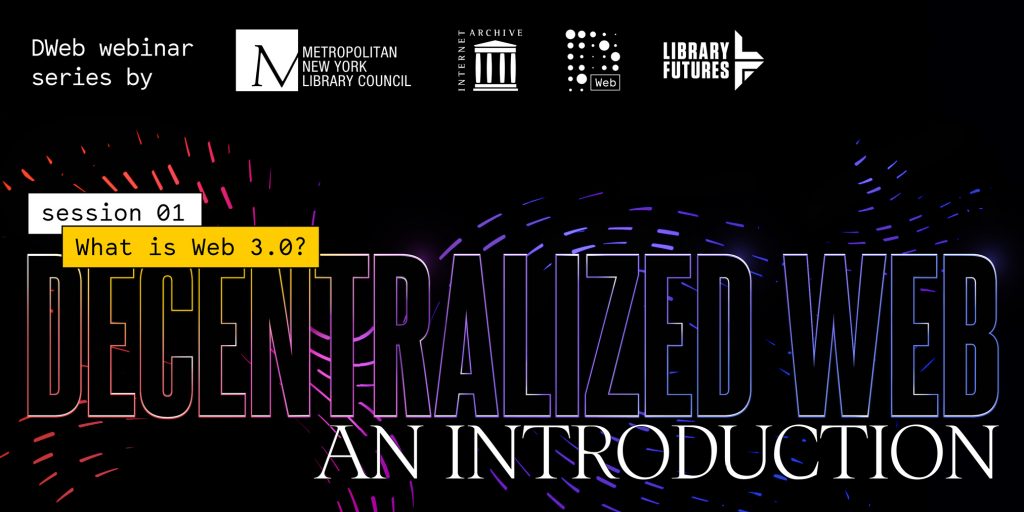
What Is Web 3.0? The Decentralized Web: An Introduction
What is the decentralized web, why is it important, and where is it along the path of development? How does Web 3 differ from Web 2? How does blockchain and cryptocurrencies fit into the ecosystem? Who are the players working to realize this vision? Why is the Internet Archive, a library, a leader in the decentralized web movement?
Thursday, January 27th, from 4:00pm to 5:00pm EST
Register
In an Ever-Expanding Library, Using Decentralized Storage to Keep Your Materials Safe
Libraries understand the headache of storing materials. How do you create room for an ever-expanding collection? What if you don’t want to weed materials to make room? Enter decentralized storage—a network of P-2-P servers that store materials across a global network in exchange for cryptocurrency. What problems does this solve? What problems does this create? Where is the state of decentralized storage today?
Thursday, February 24th, from 4:00pm to 5:00pm EST
Register
Keeping Your Personal Data Personal: How Decentralized Identity Drives Data Privacy
Want your FedEx package? Now you must allow the company to scan your ID. Check into a hotel? Hand over your passport. Rent an e-bike? Key in your driver’s license, which includes your address, birthdate, and weight. What if you could maintain control over your personal identity and share only what is needed? Enter decentralized or self-sovereign identity (SSI). In the future, we believe each person will hold an e-wallet and control his/her/their own personal information.
Thursday, March 31, from 4:00pm to 5:00pm EST
Register
Goodbye Facebook, Hello Decentralized Social Media? Can Peer-to-Peer Lead to Less Toxic Online Platforms?
Facebook, Twitter… we’ve seen them go awry when faced with the scourges of misinformation and trolling. In authoritarian regimes, entire platforms are easily blocked. Would decentralized social media, where there is no central controlling entity, be better? How do you take down damaging posts when there is no central command center? We walk you through some of the top decentralized social media platforms, from Matrix to Twitter’s Blue Sky initiative. Expect possible break-out rooms to try to get you on some of these systems.
Thursday, April 28, from 4:00pm to 5:00pm EST
Register
Web 3.0: Decentralized Apps, NFTs, and the “Next Big Thing”
When artists, nonprofits, even the NBA are racking up seven-figure payouts for otherwise mundane pieces of media, the world takes notice. What are NFTs (non-fungible tokens), and why are they so popular? Why are they so despised? In this session, we look at the crazy breakthrough apps and items that have “broken” the decentralized web, from CryptoKitties to NFTs. We’ll show you some of the fun and wacky ways people are using the decentralized web.
Thursday, May 26, from 4:00pm to 5:00pm EST
Register
Ethics of the Decentralized Web & Uses for the Law, Journalism and Humanitarian Work
Web 1.0 and 2.0 started out full of idealism, too. What is to prevent Web 3.0 from being corrupted by profit, market domination, and bad actors? What is the normative or social layer we need to build alongside the tech?
Thursday, June 30, from 4:00pm to 5:00pm EST
Register
The post Imagining a Better Online World: Exploring the Decentralized Web appeared first on Internet Archive Blogs.
DWeb Holiday Fair – December 2021 Meetup Recap
At the December 2021 DWeb Meetup, dozens of booths gathered in gather.town for a fun, virtual, get-to-know-you holiday fair. There were 30+ booths of DWeb projects, foundations, start-ups, organizations and protocols sharing their vision for the decentralized web. Attendees were able to stroll through, chat, listen and learn from each other. Presenting projects came from every part of the world!
The Holiday Fair was inspired by the festive holiday fairs of Europe. They were an opportunity for participants to see what is happening in the DWeb space, learn about new technologies, find partners, supporters, team members or funding. Projects welcomed feedback and ideas, and explored opportunities for collaborating!
Booths present at the fair included:
- Agregore, a minimal web browser for the distributed web. It integrates peer to peer protocols with the web to simplify creating and sharing apps without the internet. Its goal is to make local-first software easy to make, and to make technology more resilient and easier to make.
- Anwen/Dweb Lab which is a DWeb content community exploring Dweb Lab, Dweb Search, Dwebverse: open-source mmo 3d and vr game.
- Blue Link Labs & Paul Frazee which is developing a new project building a decentralized, self-hostable cloud using Hypercore Protocol and other Web3 technologies
- Briar, a messaging app designed for activists, journalists, and anyone else who needs a safe, easy and robust way to communicate. Unlike traditional messaging apps, Briar doesn’t rely on a central server – messages are synchronized directly between the users’ devices.
- Decentralized Future Council, a new initiative committed to educating policymakers in Washington about the future of decentralized and interoperable protocols that will transform the Internet as we know it.
- Earthstar Project, a P2P protocol and accompanying library of APIs for building collaborative and social applications, designed for human-sized (1-100) groups that already know and trust each other. This project is ideal if you want an online space where you can just be yourself, someplace safe where strangers won’t hassle you, or a place to build tools that are really tailor-made for your community, with a simple, blockchain-free API.
- eQualitie builds free and open source software on decentralized infrastructure and protocols in support of free speech and access to knowledge. It also showed its CENO (short for Censorship No!) Browser, a mobile browser for storing and sharing blocked web content, as well as the team’s newest project, OuiSync – a tool for securely synchronizing and sharing files. Both projects have been developed with the backend support of the open source Ouinet library for enabling peer-to-peer functionality, which can be integrated into many other third-party applications.
- Filecoin Foundation presented about its grants program seeking to: A) Accelerate the adoption of open, decentralized technologies; B) Build communities of practitioners, users, and champions that are mutually supporting and self-sustaining; and C) Communicate the values and benefits of open, decentralized technologies to wider audiences
- Filecoin Foundation for the Decentralized Web which welcomed conversations about a vision for a better, re-decentralized internet, and how the Foundation might be able to help.
- Fluence Labs, a peer-to-peer application platform which allows the creation of applications free of proprietary cloud providers or centralized APIs. Fluence provides a peer-to-peer development stack that allows for programming p2p applications, workflows, and compose services, APIs without relying on centralized intermediaries. Fluence’s p2p platform provides a complementary compute layer to IPFS, enabling a wide variety of decentralized use cases.
- Handshake, a naming protocol that is backwards compatible with the existing DNS system. Every peer in the Handshake network cryptographically validates and manages the root zone, which completely removes the need for the Certificate Authority system (CAs). Names are logged on the Handshake blockchain, which is essentially one big distributed zone file to which anyone can add an entry.
- The Hyper Hyper Space project aims to make decentralized applications easy to build and accessible by everyone. At the booth, participants could discuss how to power Dapps with data objects that can be instantiated anywhere (even inside a web browser), used offline and easily synchronized over the net!
- ImageSnippets – discussing metadata delivery service layers around art/imagery within the context of decentralized protocols.
- IndiView, a personal interest project in privacy which built an app and a decentralized network for communicating with friends and family. The network node is designed for self-hosting and implements a digital identity API. The mobile app supports sharing of contact details, photos, videos and chatting through the network.
- The Internet Archive, the Library of Alexandria for the digital era, which is experimenting with storing web pages, film and audio in decentralized storage –at scale! Participants could meet team lead, Arkadiy Kukarkin.
- Jolocom which is looking to empower every individual, organization, and entity capable of identity to freely communicate. Jolocom provides universally accessible and useful solutions for decentralized identity management.
- Least Authority, a technology company supporting people’s right to privacy through security consulting and building secure solutions. A leader in the security of distributed systems, Least Authority offers consulting services, develops privacy-enhancing products, and contributes to the advancement of related open source and human rights projects.
- Mask Network which aims to bridge the Web 2.0 users to Web 3.0 by bringing the decentralized application ecosystem onto traditional social networks, the Mask extension provides a decentralized option for features Web 2.0 users are familiar with. Users can enjoy secure, decentralized social messaging, payment networks, file storage, and file sharing without leaving mainstream social media networks.
- The Matrix Foundation which is the Foundation responsible for the Matrix protocol and its healthy evolution. Matrix is a federated protocol which is mostly used for instant messaging, but not exclusively. One of the other applications is full mesh VoIP. They are investing into Matrix P2P as well to have portable identities, completely independent from servers, so people are in full control of their account.
- Media Enterprise Design Lab, University of Colorado. Nathan Schneider’s CommunityRule is a governance toolkit for great communities. How does your community work? Are you ready to make hard decisions? Too often, we leave the most basic questions unstated and unanswered. CommunityRule makes it easier to clarify the basics so you can focus on other things. They showcased their prototype Web app and gathered ideas for the next-stage revision now in progress.
- Mysterium Network, an open-source, Swiss-based Web3 project making the internet borderless and accessible for all. Their decentralised ecosystem of protocols, tools and web infrastructure provides more privacy, anonymous expression, and equal access to information. The project’s flagship product, the decentralised Mysterium VPN, is available for Android, Windows and Mac. Anyone can join the peer-to-peer marketplace to rent their unused bandwidth and IP address to a global community.
- OneCommons, an early-stage startup dedicated to building a free and open cloud. The open-source platform lets you build, share and fork open cloud services that are location independent and support built-in funding mechanisms. Its mission is to realign economic incentives to nudge the Web away from the Attention Economy — based on maximizing a user’s attention at whatever cost — to an Intention Economy, where participants fund what they find worthy.
- Peergos, a p2p, E2EE secure file storage, social network and application protocol built on IPFS. Peergos is building the next web – the private web, where end users are in control. Imagine web apps being secure by default and unable to track you. Imagine being able to control exactly what personal data each web app can see. Imagine never having to log in to an app ever again. You own your data and decide where it is stored and who can see it.
- plan.tools, a community-centric content creator platform for collaboration, world building, and immersive experiences. PLAN is bridging together previously siloed industries using distributed ledger technology (DLT), p2p infrastructure, 3D graphics, open protocols, and realtime collaboration interfaces. Its vision is that the future internet will be powered by collaborative spaces built on a framework that is community-centric, off-grid capable, inclusive, as well as private and secure by default.
- Quark, the browser that shows paths across the internet. It incentivizes the expansion of Web 3.0 to users at large with an interaction design approach. Imagine if you can bump into people looking at similar online content or search results, see where they’ve been, tag along to discover content together, and even monetize it via live stream. With Quark, you can build a collective map of the internet.
- SHER, the decentralized live audio platform. That’s right, with SHER you can create your own shows. Have multiple streamers, play files and more. You don’t have to install anything, it works on your browser! Take the broadcast studio with you.
- Skynet Labs, an open protocol for hosting data and web applications on the decentralized web using the Sia blockchain. Skynet decentralizes “the cloud” so that user and application data is not stored by (and only accessible to) a single, central authority and allows users to access it without any specialized software or cryptocurrency.
- Socialroots enables functional cross-group communication, decreasing the time it takes to manage work and partnerships, and increasing engagement and productivity. Wicked Co-op LCA is an NSF funded worker owned co-op building enabling software technology for DAOs and decentralized networks of organizations to coordinate more effectively.
- Starling Lab. The USC | Stanford Starling Lab is the first academic research center in the world dedicated to exploring how Web3 technology can transform human rights. They work with historians, journalists, lawyers to securely capture, store, and verify human history using decentralized technologies.
- Sutty, a worker-owned cooperative developing a FLOSS platform for managing and hosting static websites and e-commerce. We work for and with NGOs and grass-root organizations in Latin America and we want to share with you why we think this is an opportunity for DWeb’s growth!
- Virtual Chair facilitates the organization of efficient and effective virtual events by focusing on three priorities: interaction among participants, dissemination of materials, and broadening participation. With Virtual Chair, organizers can easily take full advantage of best practices for virtual events.
- Webrecorder. Webrecorder’s goal is to make it easier for anyone to create, store and access web archives using open source tools. One of our current efforts, supported by the FIlecoin Foundation, is to standardize a format that can be used to create and render web archives directly in the browser. The format makes it possible to load web archives from IPFS as well as a local file system, or any online storage, decentralized or centralized. Webrecorder’s motto is “web archiving for all” and we are working on several tools to enable decentralized web archiving using the browser itself, allow anyone to create personalized archives of their own web browsing.
Visit GetDWeb.net to learn more about the decentralized web. You can also follow us on Twitter at @GetDWeb for ongoing updates.
The post DWeb Holiday Fair – December 2021 Meetup Recap appeared first on Internet Archive Blogs.
Welcoming Recorded Music to the Public Domain
Every January we feature works that are entering the public domain. And this year the big story is in recorded music.
Recorded Music from 1922 and earlierApproximately 400,000 sound recordings made before 1923 will join the public domain in the U.S. for the first time due to the Music Modernization Act (read more at copyright.gov). You can peruse about 38,000 of them in our collection of digitized 78rpm records.
By 1922 we were solidly in the Jazz Age – F. Scott Fitzgerald’s Tales of the Jazz Age was published in 1922, and the term was already in popular usage. Jazz migrated from Black American communities in New Orleans into the rest of the United States, having evolved from its roots in rag time, blues and Creole music. In fact, 1922 was the year Louis Armstrong left New Orleans to join King Oliver’s Creole Jazz Band in Chicago.
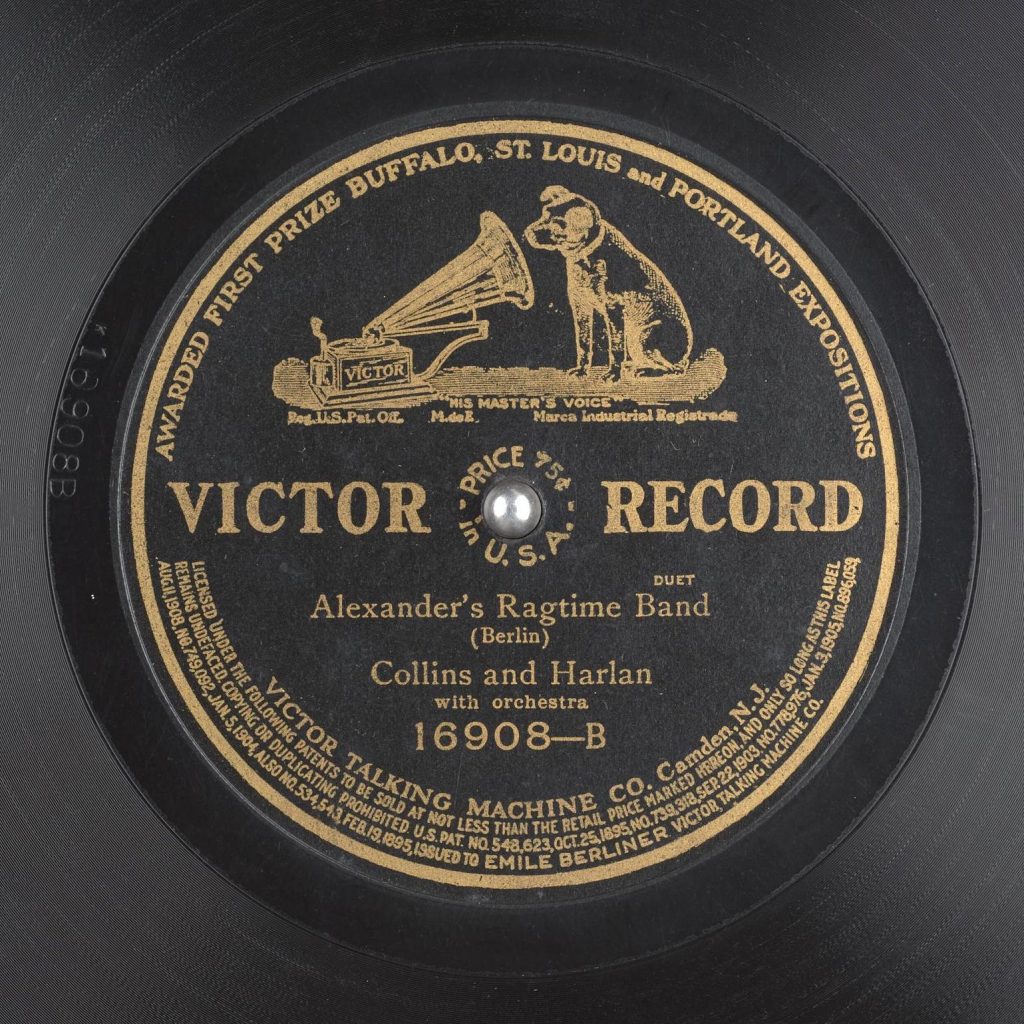 Alexander’s Ragtime Band (1911) written by Irving Berlin and performed by Collins and Harlan
Alexander’s Ragtime Band (1911) written by Irving Berlin and performed by Collins and Harlan
Peruse the collection to hear early jazz classics like Don’t Care Blues by Mamie Smith and her Jazz Hounds, Ory’s Creole Trombone by Kid Ory’s Sunshine Orchestra, and Jazzin’ Babies Blues by Ethel Waters.
Early recordings by Bert Williams (the first Black American on Broadway and the first Black man to star in a film), Fanny Brice (the real-life ‘Funny Girl’), Enrico Caruso (the legendary Italian operatic tenor), and so many others give life and flavor to our imaginings of the early 20th century.
Here are some of the top songs from 1922, to give you a taste:
- April Showers by Al Jolson
- Hot Lips by Paul Whiteman
- ‘Way Down Yonder in New Orleans by Margaret Young
- The World Is Waiting for the Sunrise by Isham Jones Orchestra
- Toot, Toot, Tootsie! (Goo’bye) by Al Jolson
- Mister Gallagher and Mister Shean
- Ory’s Creole Trombone by Kid Ory’s Sunshine Orchestra
- My Buddy by Henry Burr
- Oh! Is She Dumb by Eddie Cantor
- Three O’Clock in the Morning by Paul Whiteman
- On The Alamo by Isham Jones
But personally when I “flip through” these records I’m always drawn to the novelty songs.
There’s a whole genre of sound imitations, like Violin Mimicry where a violin is used to imitate people talking, Jingles from the Marsh Birds with a man imitating birds imitating popular songs (just as confusing as it sounds), and A Cat-astrophe with people imitating rather catastrophic cats to music.
You can also skip the jokes and go straight to laughing just for the sake of it with these gems: Laughs You Have Met, Gennett Laughing Record, and The Okeh Laughing Record, or choose to have a little music with laughing choruses like Ticklish Reuben, She Gives Them All the Ha-Ha-Ha, Stop Your Tickling, Jock! or And Then I Laughed.
And perhaps my favorite of the bunch is Fido is a Hot Dog Now which seems to be about a dog who is definitely going to hell.
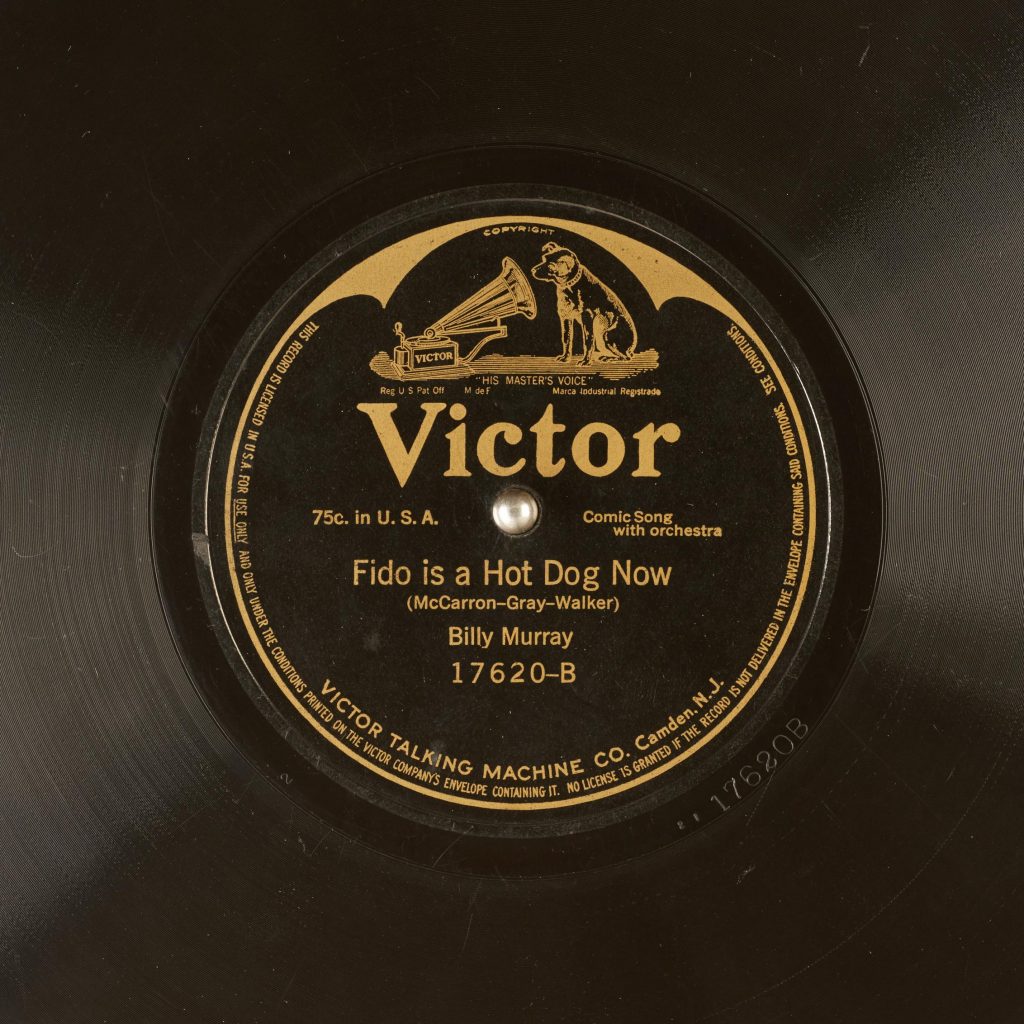 Fido is a Hot Dog Now (1914) by Billy Murray
Other Media from 1926
Fido is a Hot Dog Now (1914) by Billy Murray
Other Media from 1926
As usual, we are also welcoming some new books, movies, journals, and sheet music – this time from 1926! (Read about 1925, 1924, and 1923 in previous posts.)
Some popular first edition books from 1926:
- The Land of Mist by Sir Arthur Conan Doyle
- My Mortal Enemy by Willa Cather
- Soldiers’ Pay by William Faulkner
- The Romantic Comedians by Ellen Glasgow
- The World of William Clissold by H.G. Wells
- Tales of the Jazz Age by F. Scott Fitzgerald
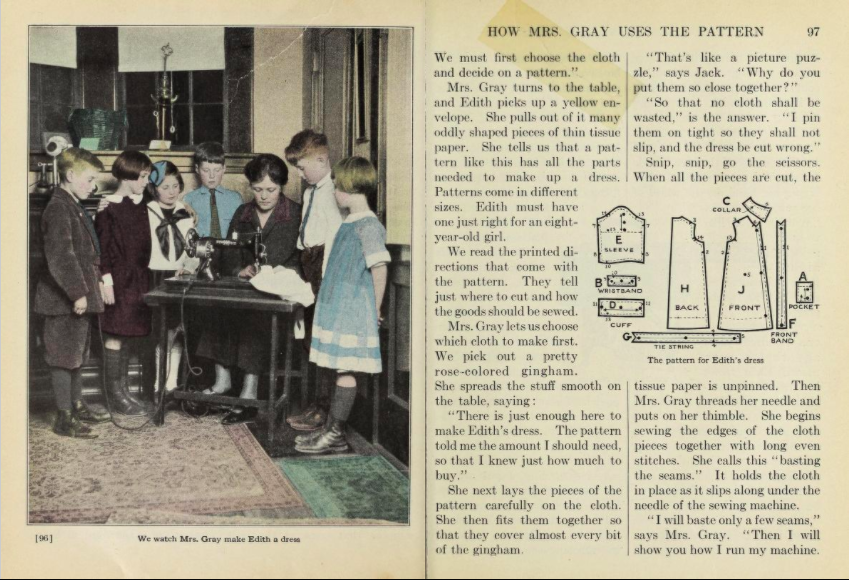 The Clothes We Wear (1926) by Frank and Frances Carpenter
The Clothes We Wear (1926) by Frank and Frances Carpenter
Other interesting books from 1926 that you might want to explore include Show Boat by Edna Ferber which was made into the musical Show Boat in 1927 with music by Jerome Kern, The Clothes We Wear by Frank and Frances Carpenter which is a child friendly exploration of how clothes are made all the way from the field through weaving and into sewing, or The Art of Kissing by Clement Wood which is pretty self explanatory.
We invite you to explore some of the other items dated 1926 in our collections to find your own fun items that may now be in the public domain.
Virtual Party for the Public DomainPlease join us for a virtual party on January 20, 2022 at 1pm Pacific/4pm Eastern time with a keynote from Senator Ron Wyden, champion of the Music Modernization Act and a bunch of musical acts, dancers, historians, librarians, academics, activists and other leaders from the Open world! (And yes, we DO have a book from 1926 about how to throw the world’s best party.)
REGISTER FOR THE VIRTUAL EVENT HERE!
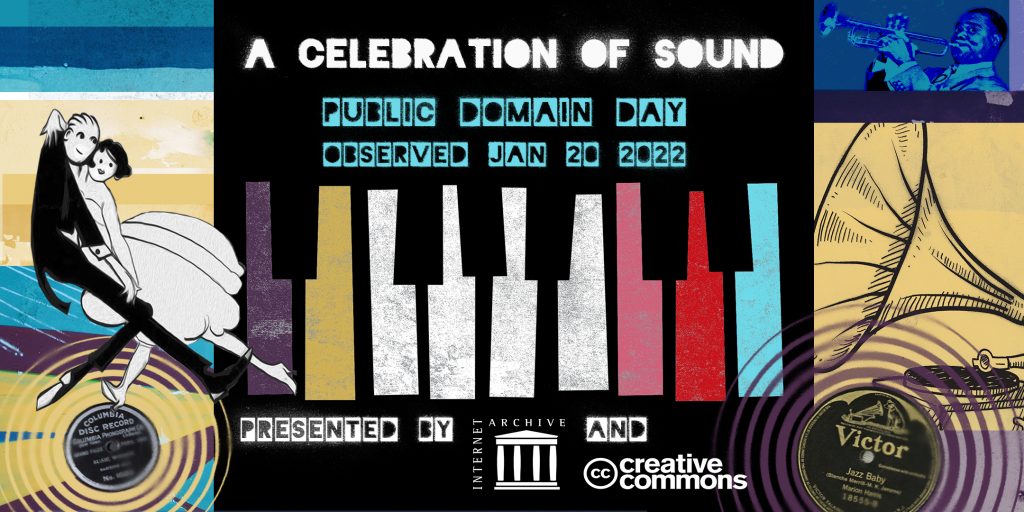
The post Welcoming Recorded Music to the Public Domain appeared first on Internet Archive Blogs.
A Holiday Jackpot: The Lounge is Open
Continuing our tradition of releasing new sets of emulated items around the holidays, the Internet Archive has added a new collection: THE JACKPOT LOUNGE.
![[screenshot]](https://archive.org/serve/arcade_vliner/arcade_vliner_screenshot.png)
Previous sets of items, including arcade machines, handheld toys, computer software and flash animations, all represent thousands and in some cases tens of thousands of individual items from history, all playable in the browser.
The Jackpot Lounge is much more focused and refers to one specific group of coin-operated games: Gambling Machines.
Not too soon after video games began replacing mechanical coin-operated games on the midway, bars and other locations, games with a gambling theme or straightforward gambling payouts began to arrive. The same arguments for video games taking over (cheaper maintenance, more dependable, easily upgradable) applied to these potential replacements for slot machines.
![[screenshot]](https://archive.org/serve/arcade_super21/arcade_super21_screenshot.png) “Super Twenty One”, a gambling machine from 1978. the same year as Space Invaders.
“Super Twenty One”, a gambling machine from 1978. the same year as Space Invaders.
While such games would exist in a grey zone for a few years, Poker and Slot/Fruit machines of a video game nature quickly fell under the jurisdiction of gaming authorities in different countries. In some cases, however, it is clear looking through the code of these games that a select few cheated or ended winning runs quickly.
![[screenshot]](https://archive.org/serve/arcade_comg076/arcade_comg076_screenshot.png) “Cal Omega”, a 1981-era poker machine.
“Cal Omega”, a 1981-era poker machine.
Still, there was little to compete with the complete automation and dependability of these machines, and over time they took over gambling houses and areas where games of chance were legal. Even the venerable and charming mechanical horse-racing games began to fall compared to a simple horse-racing videogame like Status Fun Casino:
![[screenshot]](https://archive.org/serve/arcade_funcsino/arcade_funcsino_screenshot.png) “Status Fun Casino”, a 1981 game for betting on various casino games, including horse racing.
“Status Fun Casino”, a 1981 game for betting on various casino games, including horse racing.
As more and more pressure came down to ensure the slot and poker machines had dependable random number generation and payouts, the games became more homogenized, only reflecting changes in sound and visuals while letting the rules stay dependably the same.
From those early beginnings, the increase in quality of sound and video with videogames extends to gambling machines – the colors are bright, the sounds intense, and all are intended to catch your eye and bring you over to play “just a few rounds”.
![[screenshot]](https://archive.org/serve/arcade_blkrhino/arcade_blkrhino_screenshot.png) “Black Rhino”, a 1996 example of the advances in the look of video slot machines, including multi-line bets and amounts of payout.
“Black Rhino”, a 1996 example of the advances in the look of video slot machines, including multi-line bets and amounts of payout.
Reflecting that we are now closing in on a decade of emulation at the Internet Archive, it seems a good time to bring in this class of machines, which have at the start of each game a very complicated start-up process. Reflecting that actual money could be involved with a machine and the tallies of what it was paying out for the day would be very important to a casino, these games have very complicated processes for starting up. By pressing these keys, you are simulating Audit and Jackpot keys being inserted, sign-off buttons are being pressed, and that the metal “cage” door of the machines were closed and locked. Thanks to a set of volunteers, however, these extremely un-intuitive keypresses have been documented for you.
Because of the nature of this genre of machine, many of the 500+ machines will look rather similar: made by the same companies, with only minor modifications to the code to reflect different rules or providing compatibility with gaming commission chips (which would not be manufactured by the game companies, but supplied to them under authority of the commission). Others, however, will seem like strange one-off creations that you can’t imagine attracted anyone to play them – except they did.
One particular fascinating set of machines exists in this collection: Stealth Gambling Machines, meant to look like one kind of video game, but secretly playing another, based on when a secret switch (or secret coin slot) was used. In countries where hosting a gambling machine of any sort held severe penalties. For example, this game acts like Breakout but is actually a poker machine.
 It looks like Breakout – but put your money into the secret coin slot and the game will play poker instead.
It looks like Breakout – but put your money into the secret coin slot and the game will play poker instead.
And finally, let’s just remember that sometimes, the game is out to get you. The game Tetris Payout will wait until you are winning a bit too much, and then intentionally throw the worst pieces at you to ensure your game comes to an end early.
So go ahead, check out the lounge, and walk through decades of electronic coin-operating casinos. You can’t win real money…. but you can’t lose it, either.
A very large thank you to Xarph and others, who played through these hundreds of machines to learn the by-machine instructions for getting them into a standard playing mode. The process was weeks of work and incredibly appreciated.
If coming into contact with gambling machines causes stress or issues for you or your family, contact Gamblers Anonymous.
The post A Holiday Jackpot: The Lounge is Open appeared first on Internet Archive Blogs.
Internet Archive Supports the Maryland’s Library eBook Fairness Law
Maryland’s modest Library eBook Fairness Law requires publishers that make digital products available to residents of Maryland to also make those same resources available to libraries on reasonable terms. Some publishers have not treated libraries reasonably in the past. Instead, they have arbitrarily raised prices, imposed draconian limits on how libraries can use digital materials, and in some cases, refused to license digital materials to libraries at all. Under these conditions, libraries have had difficulty providing access to essential resources and services for their communities at a time when they are most in need. This is the wrong that Maryland’s law seeks to right, and it is set to go into effect next month.
The Association of American Publishers (AAP) is a powerful Washington, D.C.-based lobbying group that has pushed for ever more power and market control for their billion-dollar publishing company members. In its lawsuit to block Maryland’s Library eBook Fairness Law, the AAP asserts that states are powerless to step in when its members abuse their market power in contractual relationships with libraries. This does not seem right in law or practice–states can and should defend their libraries from predatory practices.
The Internet Archive is defending a lawsuit against four of the world’s largest publishing companies–all members of the AAP–over the most fundamental service that libraries provide, lending books. It is beyond disheartening that the AAP has chosen to go on this attack on libraries during a global pandemic, when schools, teachers, and students are most in need of digital resources. We urge the court to stand with libraries and dismiss the AAP’s lawsuit against the State of Maryland.
The Internet Archive is a 501(c)(3) nonprofit library for the digital age, with a mission to support universal access to all knowledge. Libraries serve communities by providing necessary educational and career materials and other civic services. We appreciate states like Maryland that are working to update laws so that libraries can serve their essential societal function in the digital age.
The post Internet Archive Supports the Maryland’s Library eBook Fairness Law appeared first on Internet Archive Blogs.
2021 Empowering Libraries Year in Review
This year the Internet Archive continued to reach our patrons, supporters, and library partners through virtual events and programming. As we close out 2021, let’s look back at some of the highlights of the year:
Events- We brought together copyright experts, authors, publishers, and librarians for Mythbusting Controlled Digital Lending, to debunk the most common myths about the library practice.
- Following on the success of the Mythbusting session, in June we assembled a panel of experts to discuss the most Frequently Asked Questions about Controlled Digital Lending (or FAQ:CDL for short)
- This fall, we hosted our annual Library Leaders Forum, featuring two virtual sessions and 3 conference workshops. All of the session videos are online and available for viewing.
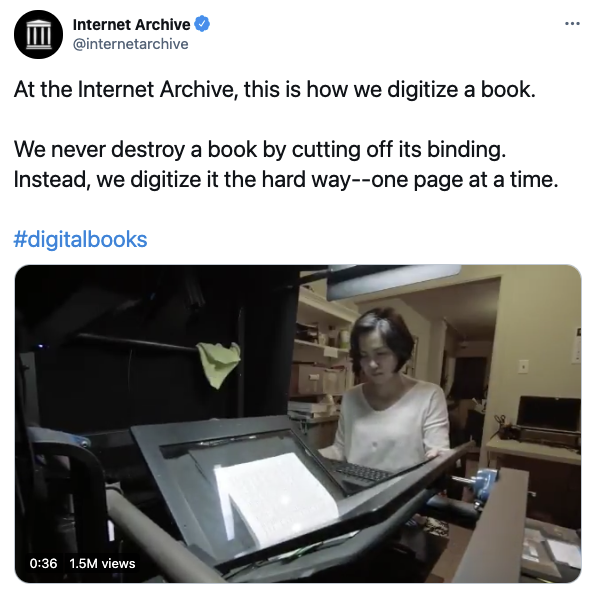
- In February, we shared a video on social media showing how we digitize a book, and it quickly went viral. So many readers were interested in the process and the people behind the work that we wrote a blog post about Eliza Zhang, the staff member featured in the video.
- The Internet Archive’s modern book collection now has more than 2 million volumes available to borrow through Controlled Digital Lending.
- Following more than ten years of collaboration and cooperation, the Internet Archive joined the Boston Library Consortium.
- Internet Archive began an interlibrary loan pilot in April, and talked about the success of the program during a resource sharing webinar this fall.
- In October the Internet Archive celebrated its 25 anniversary in a live, hybrid event beamed to the world from the Internet Archive headquarters in San Francisco.
- Library Futures launched in January. The new non-profit is working to support a technology-positive future for libraries.
- The AAP and four corporate publishers continued their lawsuit against the Internet Archive.
- In September, Senator Ron Wyden (D-Oregon) & Representative Anna Eshoo (D-California) sent an inquiry to the “Big Five” publishers to investigate their activities in the e-book marketplace. They followed in November with letters to nine e-book aggregators and platforms, inquiring about restrictive e-book licenses.
- The AAP sued the state of Maryland over its e-book lending law, which was set to take effect on January 1, 2022.
- The International Federation of Library Associations & Institutions (IFLA) backed Controlled Digital Lending in a strong public letter of support.
- The Internet Archive has continued its donations program, receiving media that libraries can no longer house for preservation and digitization. About the donations program, including an informational webinar.
- The Internet Archive is now the preservation home of the Michelson Cinema Research Library, the collection curated by famed cinema librarian and researcher Lillian Michelson.
- Libraries struggle to find a home for collections that no longer fit their collection development priorities. That was the case with Hamilton Public Library in Ontario, which donated a fantastic collection of American and British theater books for preservation and digitization.
- As education continues to use and explore hybrid learning models, colleges and universities are reviewing their physical collections and considering how best to serve their students. Some schools, like Bay State College, are making a full move to digital.
- Brewster Kahle sat down with authors Deanna Marcum and Roger C. Schonfeld for a discussion of the history of library digitization described in their book, Along Came Google.
- Catherine Stihler, CEO of Creative Commons, talked with author Peter B. Kaufman about his book, The New Enlightenment.
- Historian and author Abby Smith Rumsey discussed the history of intentional knowledge destruction with librarian Richard Ovenden, as featured in his book, Burning the Books.
- Internet Archive’s Wendy Hanamura talked with author Joanne McNeil (“Lurking”) and technologist/artist Darius Kazemi about the rise of Google in the 1990s and the impact on libraries and society in Why Trust a Corporation to do a Library’s Job?
The post 2021 Empowering Libraries Year in Review appeared first on Internet Archive Blogs.
25 Years of Making The World A Better Place
He drove a 1970’s Chevrolet Chevelle Concours station wagon, complete with faux-wood paneling and a rooftop luggage rack. Every summer, he’d drive our family up to our cabin in Northern Michigan to get us, as he’d say, “out of the house and into the woods.”
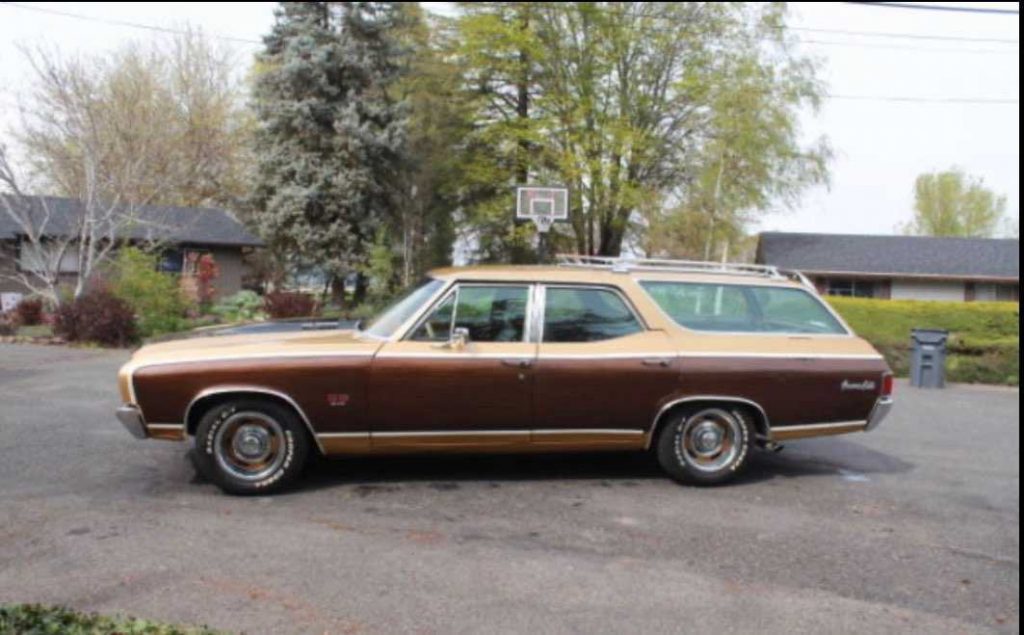
It was an endless adventure of learning with my father. He especially loved teaching us about animal habitats, ecosystems, and species of trees.
His National Geographic magazine collection up on bookshelves in our living room was always a treasure trove of information. He always enjoyed spending evenings reading in his favorite chair. I’d sneak into the room after he left for work, just to get my hands on the magical picture books filled with pages of exotic animals and far away places.
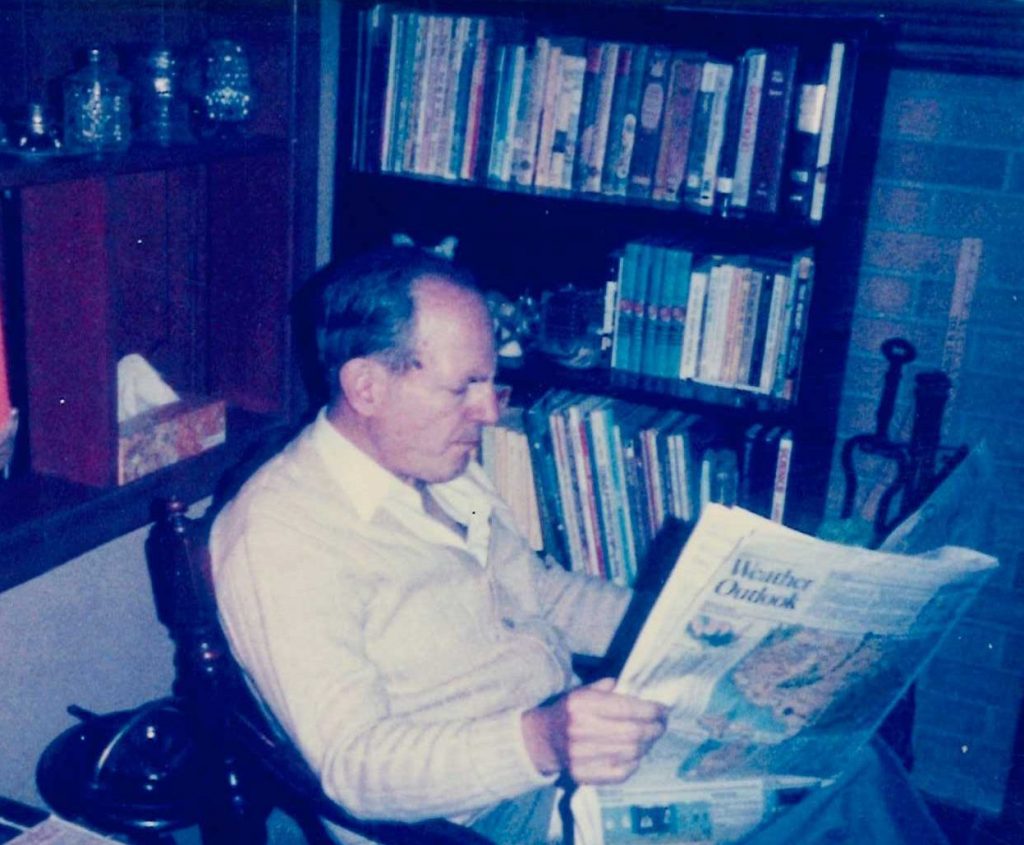
Those magazines spanned a lifetime of important information that opened up my father’s world—and eventually mine. He took from his books and magazines an expansive knowledge of nature and geography, and transferred that knowledge and love of the outdoors back to me.
Then, there was my mom.
For as long as I can remember, my mom always enjoyed giving back. She always was the first to notice needs in the community. It was during the holiday’s where I saw this gift demonstrated most. She always said, “to whom much is given, much is required.”
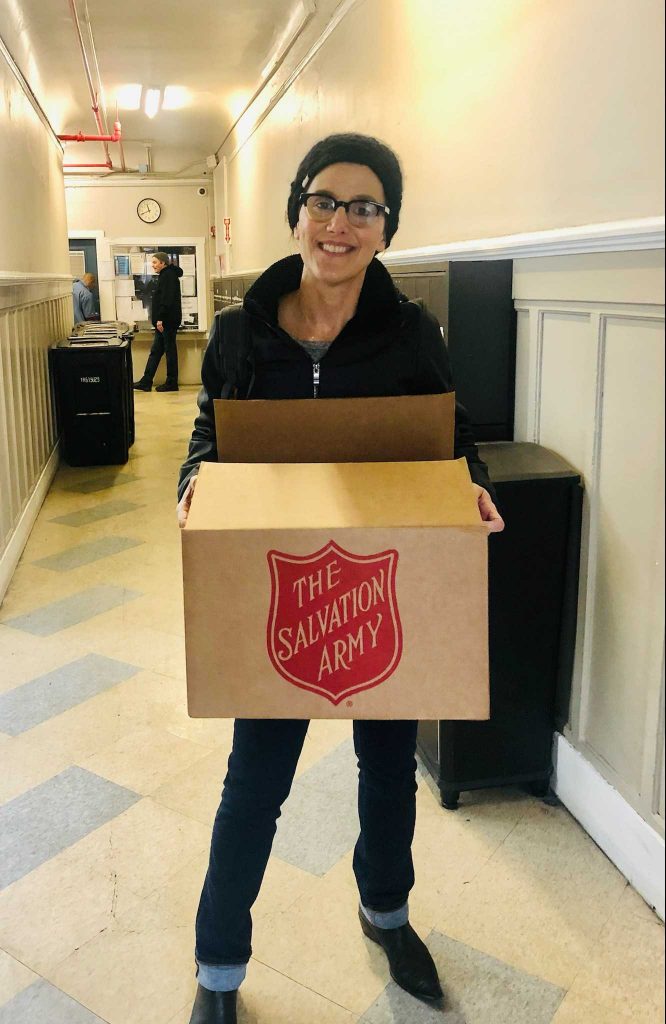
This is why she packed us kids into that same wood-paneled Chevrolet station wagon and drove us downtown to volunteer at the Salvation Army. It’s a Holiday tradition I practice to this day.
We’d spend the morning together sorting clothes and packing boxes full of canned food and toys, to make sure other little girls like me would have something special for Christmas. My mom told me that she was once one of those girls growing up in the projects of Detroit. This childhood experience motivates her today to pay it forward.
On weekends, she used to drive us to the local hospital in Rochester, where we volunteered as candy stripers. Adorned in pink and white hospital uniforms, we passed out flowers and books to eager patients looking for a good read and a kind word to pass the day. Sometimes these books were the only thing that helped sick patients escape the pain, loneliness, and longing for better days ahead.
It was during those times that I became aware of the welfare of others and what our shared humanity could look like. About not only being open to the differences we all share, but to love and value those differences.
From my father’s passion for nature and knowledge and my mother’s generous heart, I learned that the pursuit of knowledge and generosity are inseparable.
And it’s at this intersection of knowledge and philanthropy that I have found myself.
As the Director of Philanthropy at the Internet Archive, I lead a team that educates millions of people all over the world about, well, everything. Including why it’s so important to preserve humanity’s knowledge—to preserve our collective footprint of culture and memory.
And now, thanks to the Internet Archive, every day more than 1.6 million people access our nonprofit digital library. Accessed by genealogists, gamers, scientists, teachers, students, journalists and poets, the Internet Archive stores curated collections of more than 6 million books, 240,000 concerts, 5 million videos, 32 million magazines and other texts, 25 million scholarly research materials, 625 billion web pages—about everything in the world. Literally. For free. You can even access my favorite collection from the Biodiversity Heritage Library.
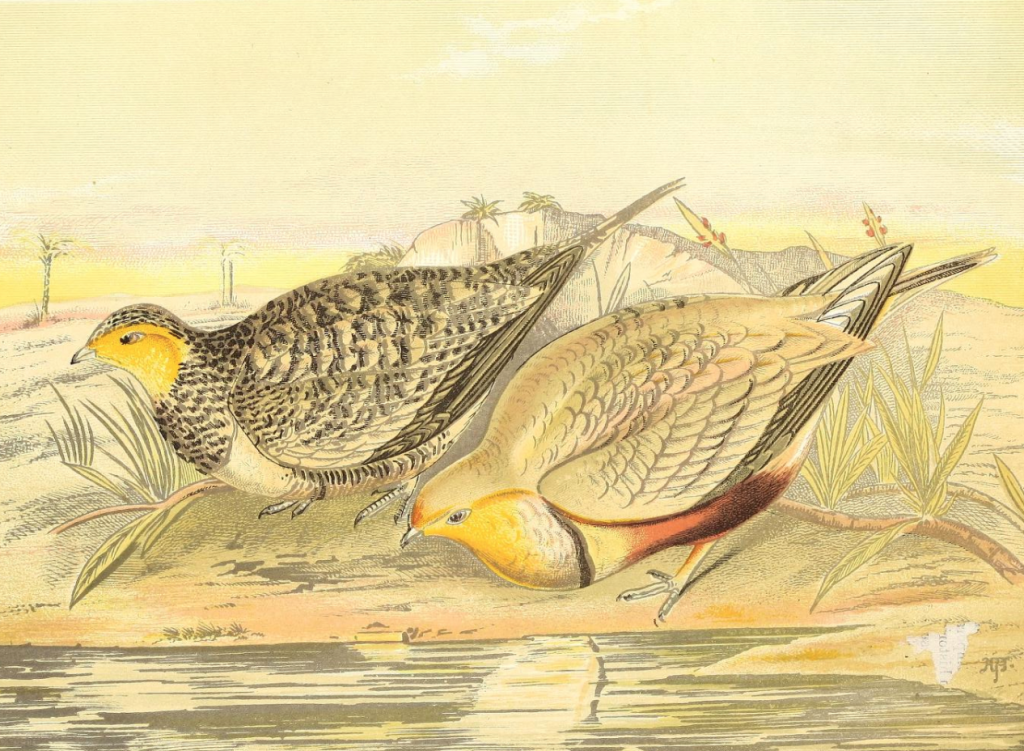
This year marks the 25th Anniversary of the Internet Archive. A celebration of 25 years of fulfilling the mission of providing Universal Access to All Knowledge.
Personally, I am celebrating my 25th year in philanthropy.
After 25 years of leading philanthropy departments at some of the largest nonprofit organizations in the world with missions providing access to education, clean water, medicine, gender equity, and innovation, I now find myself serving over 100,000 contributors from all over the world. I’m grateful to be part of a vision that’s creating an online repository of knowledge—for keeping a record of history that can’t be erased, and is accessible to millions worldwide.
Knowledge, as we know, is the foundation of everything.
Now, I invite you to take your own journey by exploring an endless reservoir of information—explore the Internet Archive for yourself.
You never know where that journey will take you.
Please visit us at archive.org/donate and consider making an end-of-year donation by December 31st. We have a generous 2:1 match that triples your impact. Please share your own personal journey with us on social media (twitter, FB, Insta links). Most importantly, we are deeply grateful for your continued generosity and support.
Wishing you a happy and healthy Holiday season!
—Joy
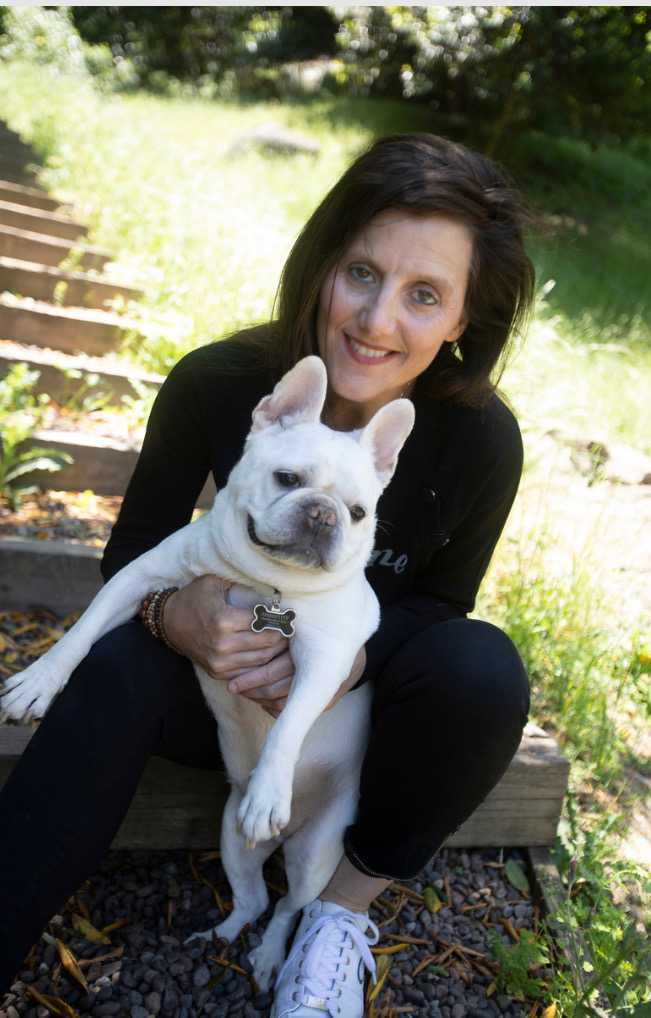
Joy Chesbrough is the Director of Philanthropy at the Internet Archive. When she’s not reading books and magazines about biodiversity or endangered species, you can find her serving on the Board of Directors at the What If Foundation, which educates and serves school children of all ages in Haiti. She also enjoys sailing, traveling, and volunteering in her community with her French bulldog, Napoleon.
The post 25 Years of Making The World A Better Place appeared first on Internet Archive Blogs.
Link Taxes: A Bad Idea for Journalism and the Open Internet
For many years, some of the world’s largest news publishers have been seeking ways to expand their power online. In Australia, they were able to do so through an unusual form of mandatory arbitration. But underneath these kinds of proposals, whether based in arbitration or otherwise, is a claim to a new sort of copyright right. Often styled as an “ancillary” copyright, such a right could—as described in a recent Copyright Office document—require payment to news publishers from any “online service that collects links to and sometimes snippets of third-party articles and makes them available to its readers.” In other words, this new right would allow big news publishers—and only news publishers—to extract fees from webpages that include links. Unsurprisingly, many have described this as a link tax. And it is now under study at the United States Copyright Office.
We believe link taxes are a bad idea. At a basic level, they are inconsistent with a free and open internet, which relies on the ability of any website to freely link to any other website. But we also do not see that they would achieve the stated goal of protecting journalists against unfair competition. Link tax payments wouldn’t actually go to journalists—instead, under current proposals, they’d go directly to publishers like Rupert Murdoch’s News Corp. This would only make it harder for small, independent, and innovative journalistic upstarts to compete; big companies like News Corp would get this new payment, while small independent journalists would not. Indeed, for these and a variety of other reasons, many have questioned not only whether such proposals support the public interest, but whether they are even consistent with the US Constitution. Supporting quality local journalism is something we can all stand behind, but imposing a link tax on the open web is not the way to do it.
As we have often mentioned, even well-intentioned changes to copyright law can have wide-reaching and negative effects on the online information ecosystem. That is why Internet Archive was proud to voice these concerns in a recent submission to the US Copyright Office and at a public roundtable on December 9, 2021.
The post Link Taxes: A Bad Idea for Journalism and the Open Internet appeared first on Internet Archive Blogs.
Boston Phoenix Rises Again With New Online Access
For more than 40 years, The Boston Phoenix was the city’s largest alternative weekly in covering local politics, arts, and culture.
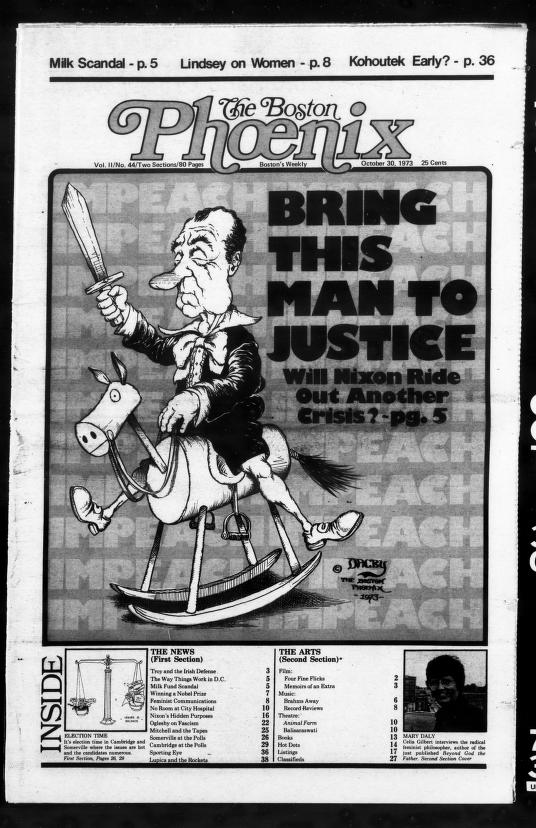 The Boston Phoenix, Volume 2, Issue 44 – October 30, 1973
The Boston Phoenix, Volume 2, Issue 44 – October 30, 1973
“It was really a pretty legendary paper. The style of the writing and the quality of writers were nationally known,” said Carly Carioli, who started at the newspaper as an intern in 1993 and became its last editor-in-chief.
With the advent of online advertising, it struggled like many independent newspapers to compete. In 2013, the Phoenix folded.
After the publication shut down, owner Stephen Mindich wanted the public to be able to access back issues of the Phoenix. The complete run of the newspaper from 1973 to 2013 was donated to Northeastern University’s special collections. The family signed copyright over the university.
Librarians led a crowdsourcing project to create a digital index of all the articles and authors, which was helpful for historians and others in their research, said Giordana Mecagni, head of special collections and university archivist. Northeastern had inquired about digitizing the collection, but it was cost prohibitive.
As it turns out, the Internet Archive owned the master microfilm for the Phoenix and it put the full collection online in a separate collection: The Boston Phoenix 1973-2013. Initially, the back issues were only available for one patron to check out at a time through Controlled Digital Lending. Once Northeastern learned about the digitized collection, it extended rights to the Archive to allow the Phoenix to be downloaded without controls.
Read The Boston Phoenix at the Internet Archive“All of a sudden it was free to the public. It was wonderful,” Mecagni said. “We get tons and tons of research requests for various aspects of the Phoenix, so having it available online for free for people to download is a huge help for us.”
Inquiries range from someone trying to track down a classified ad through which they met their spouse, or an individual looking up an article about a band. The paper was a leader in writing groundbreaking stories about the LGBTQ community, the AIDS crisis, race and the Vietnam War—often issues not covered in the mainstream press. “Making that coverage public is adding an immense amount to the historical record that would not be there otherwise,” said Carioli. He said he appreciates the preservation and easy access to back issues, as do other journalists, researchers and academics.
“It’s a dream come true,” said Carioli of the Internet Archive’s digitization of the newspaper. “The Phoenix was invaluable in its own time, and I think it will be invaluable for a new generation who are just discovering it now. It was a labor of love then and the fact that it’s online now is huge for Boston, but also for anyone who’s interested in independent media and culture.”
The post Boston Phoenix Rises Again With New Online Access appeared first on Internet Archive Blogs.
Three Ways to Celebrate the Public Domain in 2022

On January 20, 2022, the Internet Archive, Creative Commons and many other leaders from the Open world will honor the treasure trove of works published in 1926 that will enter the public domain next year. The public domain will grow richer with canonical works from authors like Hemingway, Faulkner and Dorothy Parker, silent film classics like Nanook of the North, and beloved children’s stories about Winnie-the Pooh and the Hundred Acre woods, becoming freely available to all.
Due to the recently enacted Music Modernization Act in the U.S., approximately 400,000 sound recordings from the pre-1923 era will join the public domain for the first time in our history. That’s why this year our theme is a Celebration of Sound.
Join us for a virtual party on January 20, 2022 at 1pm Pacific/4pm Eastern time with a keynote from Senator Ron Wyden, champion of the Music Modernization Act and a host of musical acts, dancers, historians, librarians, academics, activists and other leaders from the Open world! This event will explore the rich historical context of recorded sound from its earliest days, including early jazz and blues, classical, and spoken word recordings reflecting important political and social issues of the era.
Additional sponsoring organizations include: Library Futures, SPARC, Authors Alliance, the Bioheritage Diversity Library, Public Knowledge, ARSC, the Duke Center for the Study of the Public Domain, and the Music Library Association.
REGISTER FOR THE VIRTUAL EVENT HERE!
The Internet Archive will also host an in-person Dance Party on Thursday, January 20, 2022 at 6pm at 300 Funston Ave in San Francisco. There you can mingle with like-minded public-domain enthusiasts while sipping a Gin Rickey, a Hanky Panky or a Singapore Sling. Dine on shrimp cocktail, cucumber sandwiches or waldorf salad. There will be dance instructors to help you learn the 1920’s dance sensation – the Charleston. Period costumes encouraged. Let’s kick up our heels for the Public Domain!
You can register for the live, in-person event in San Francisco here.
The Internet Archive Canada will host an in-person event at their new HQ in Vancouver, BC, in the historic Permanent building at 330 West Pender Street on Saturday, January 22, 2022.
As well as celebrating The Public Domain, this evening of live music and 1920s inspired h’or d’oeuvres also acts as the official launch party of IAC’s new headquarters.
You can register for the live, in-person event in Vancouver here.
The post Three Ways to Celebrate the Public Domain in 2022 appeared first on Internet Archive Blogs.
Open Library Offers New Possibilities for Musician Who is Blind
Matthew Shifrin is a musician, graduate school student, podcaster, rock climber, and comic book fan. The 24-year-old who lives in Newton, Massachusetts, is also blind. When he wants a book for a research paper or just leisure reading, he often needs more than what a campus library or local store can offer.
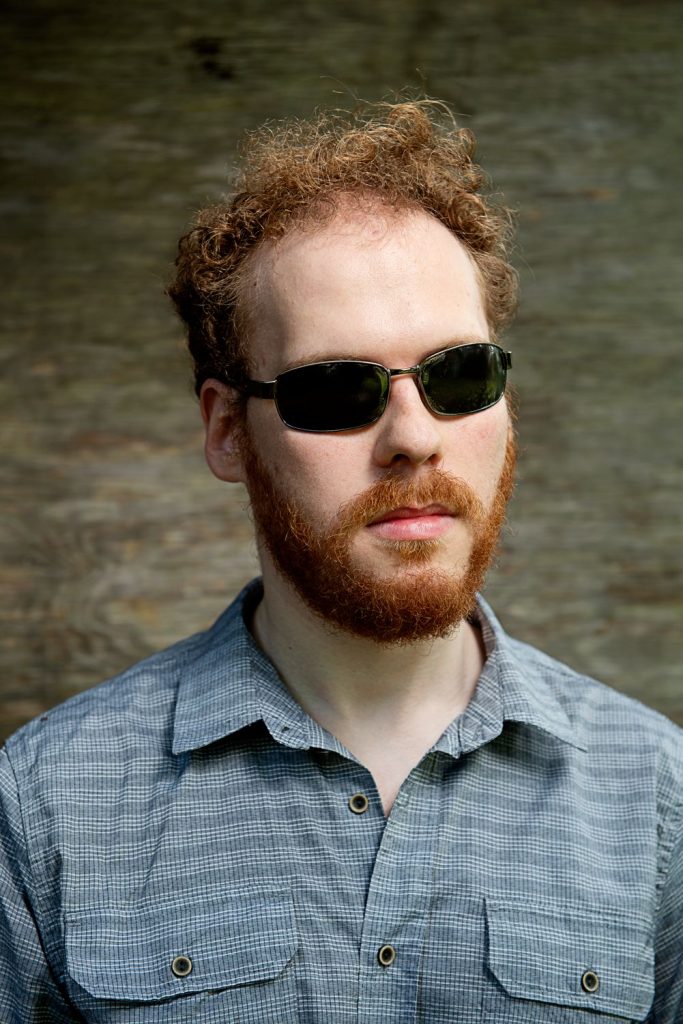 Matthew Shifrin. Photo credit: Webb Chappell.
Matthew Shifrin. Photo credit: Webb Chappell.
Shifrin has relied on Open Library to borrow digital books in formats that he can download for reading on his computer, which has a Braille display. As part of the Internet Archive’s program for users with print disabilities, he can skip waitlists for the ebook collection and download protected EPUBs and PDFs.
“The process is simple and efficient,” says Shifrin. “The Internet Archive has a huge amount of accessible books—Italian grammar books, children’s poetry—the most random things. It’s the best because you never know what you will come across. You can search for something specific, but also just wander the virtual shelves.”
Shifrin is in his first year of graduate school studying classical singing at the New England Conservatory, where he also got his undergraduate degree in music. Although audiobooks are useful, he prefers to read a book with his Braille computer because it’s faster and he can go at his own pace.
The Digital Accessible Information System (DAISY) books are in a special encrypted format that makes them easy to navigate. Shifrin also uses library websites designed for blind people such as Bookshare and National Library Service for the Blind, but often finds older or niche music books through the Internet Archive.
For instance, he was recently able to download On the Track: A Guide to Contemporary Film Scoring and The History of Western Music, which were useful in writing an essay on music criticism. He was also able to enjoy a book of poetry by David McCourt that he says brought back “flickers of his childhood.” In addition to books, Shifrin uses the Archives’ wealth of videos, movies, and music in the public domain from all around the world.
Shifrin is currently writing a one-man musical and his creative outlets have included podcasting and essay writing. He recently produced the Blind Guy Travels podcast on PRX’s Radiotopia and had an article in the Boston Globe about how he is using technology to decipher facial expressions.
In all of his work, Shifrin said he values the Internet Archive’s collection: “It’s been a great resource for all the books and all the content that I couldn’t find in other places.”
Learn more about the Internet Archive’s program for patrons with print disabilities.
The post Open Library Offers New Possibilities for Musician Who is Blind appeared first on Internet Archive Blogs.
The Wikimedian On a Mission to Connect Everything
From her home in Wellington City, New Zealand, Siobhan Leachman is devoted to doing what she can to make it easier for the public to access information about scientific discoveries. In particular, she wants to highlight the contributions of women in science.
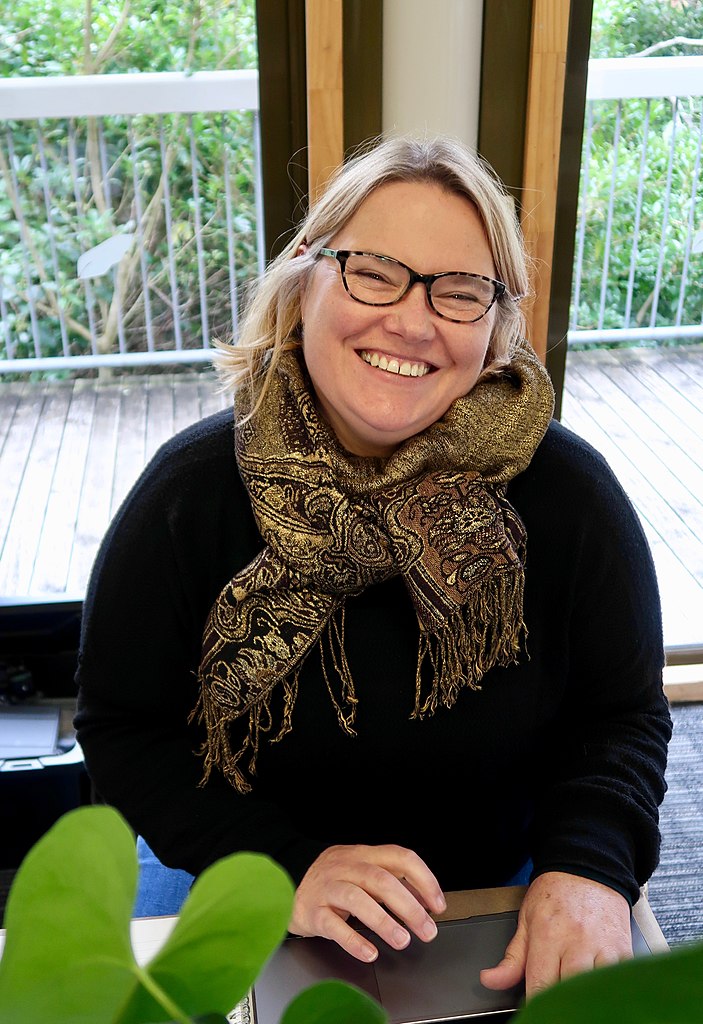 Wikimedian Siobhan Leachman, taken at the 2019 Wellington Botanic Garden BioBlitz. Source
Wikimedian Siobhan Leachman, taken at the 2019 Wellington Botanic Garden BioBlitz. Source
Leachman is a volunteer Wikimedian, digital curator, and citizen scientist. She uses open content to create open content. Her mission in life: To connect everything. And in doing so, she relies on the Internet Archive—and adds to its resources.
The Wayback Machine is vital to Leachman’s work, which focuses on putting reference citations in Wikidata or Wikipedia. If she comes across a broken link in her research, the Wayback Machine is her go-to source to recover it. As Leachman edits an article and inserts the digital URLs, she also saves her work through the Internet Archive for others.
“It’s part of my workflow and just takes a couple of minutes,” she said of sharing the references she finds with the Wayback Machine. “It means the information is there in perpetuity. Five years down the road, what I was using as a reference is still there—rather than worrying about the link disappearing into the ether.”
Leachman got started as a digital volunteer for the Smithsonian transcribing journals. “I just fell in love with doing it,” she said. “I’d end up going down these research rabbit holes, finding out about the people and I’d want to know more.”
In her research, Leachman has gravitated to natural history, learning about different species and wanting to preserve knowledge about New Zealand’s biodiversity. She reviewed diaries of scientists collecting specimens and was spurred to do more research about their lives.
Leachman uncovered many women who had made contributions, but whose stories were not chronicled. One of the scientists she’s researched is Winifred Chase, an American who participated in a botanical expedition to the South Pacific in 1909 with two other women. Leachman helped trace lantern slides created by Chase on the journey to New Zealand, which she incorporated into her Wikipedia entry on Chase’s life.
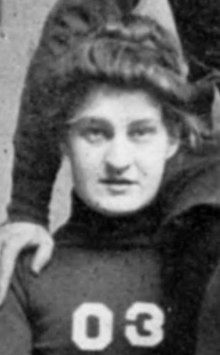 Winifred Chase
Winifred Chase
Learn more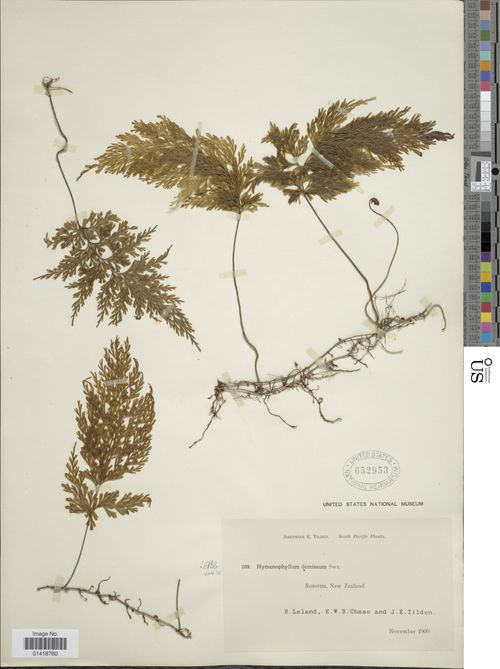 Specimen collected by Chase
Specimen collected by Chase
View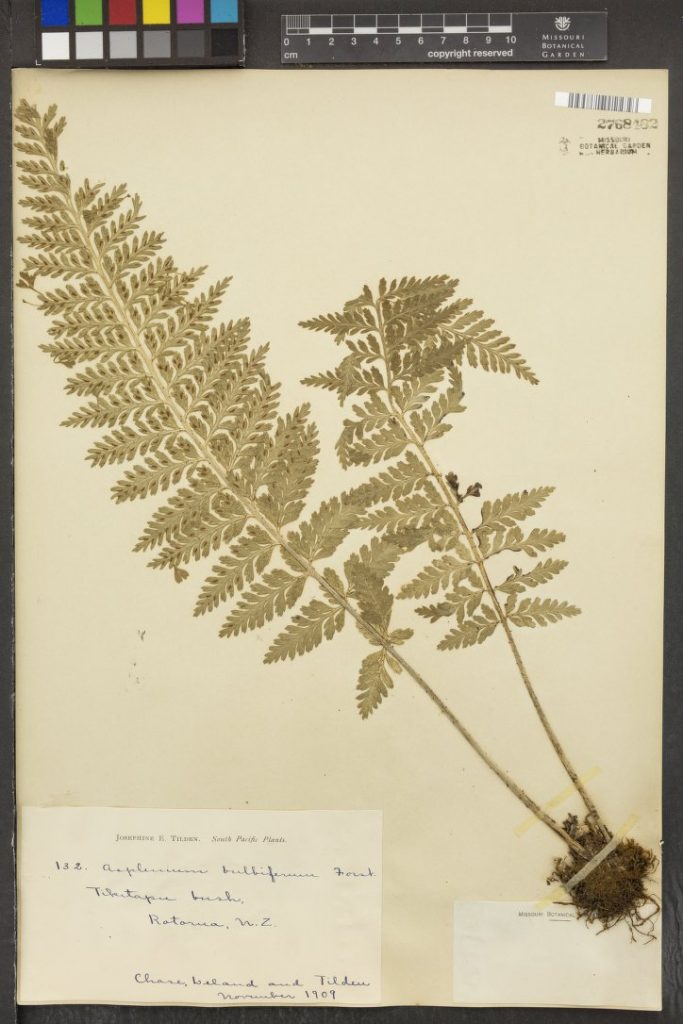 Specimen collected by Chase
Specimen collected by Chase
View
To complete the profiles of the scientists she’s researching, Leachman tracks down information about their lives and work through genealogy sites, as well as year books and natural history society journals found in the Internet Archive and borrowed via her Internet Archive account. “It’s absolutely thrilling. I love the stories,” she said of her research. “It’s as if you are reaching across time.” Leachman pieces together details and writes articles about female scientists, and in doing so, has become an advocate for open access.
“I’m keen on showing that women have contributed to science forever. It’s just not well documented,” said Leachman, who found many of the subjects she’s covered were amateur botanists or entomologists. “They’ve done a lot of work, but it’s like me—unpaid, a hobby. But they still contributed to science.”
Although some did not have university qualifications, women played a role over the years, said Leachman, and it’s important they get the recognition they deserve.
She often links her findings to the Biodiversity Heritage Library, a worldwide consortium of natural history, botanical, research, and national libraries working together to digitize the natural history literature held in their collections and make it freely available online. The Internet Archive partners with BHL and its member libraries by providing digitization, storage and access for scanned books.
Closer to home, the New Zealand National Library recently faced a dilemma about what to do with low-circulating physical material it no longer had the space to store. Leachman applauded the Library’s initial plans to donate 600,000 excess books to the Internet Archive, but laments the announcement this week that the donation is on pause. Once digitized, the books would have been accessible to anyone through Controlled Digital Lending, and could have been linked to Wikipedia. In Leachman’s view, the donation and digitization of these books would greatly improve access to the knowledge held within these publications for the benefit of all—not just New Zealanders, but for the world. She is hopeful that this hiatus will be short-lived and that the National Library will soon be sending those books to the Internet Archive for the good of all.
Added Leachman: “The Internet Archive rocks my world. I just love it. It’s so easy to get what you need. I just think it’s amazing.”
The post The Wikimedian On a Mission to Connect Everything appeared first on Internet Archive Blogs.
A 2-For-1 Cyber Celebration
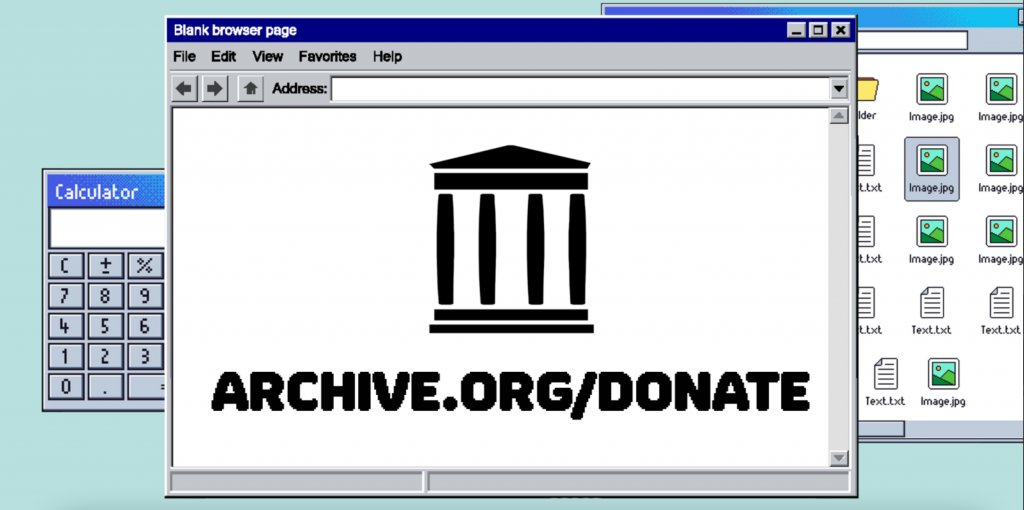
The Internet has revolutionized everything from how we work to how we play—even how we do our holiday shopping. Although there’s a lot of advertising, spin, and flashy discounts crowding the Web, there are also hidden gems and common goods. This Cyber Monday, we’re celebrating the original promise of cyberspace: a place where anyone can share knowledge freely.
From the beginning, the Internet Archive was meant to be a Library of Everything for the digital age. Not only would it be a resource available to the entire world, but it would be a step forward into the future—smarter than paper and more accessible than a physical library. For 25 years we’ve been building the our collections, with help from our community every step of the way. Your support has always been crucial for our work.
Right now we’re in the middle of our End of Year fundraising campaign. Thanks to a generous anonymous donor, all gifts received through December 31, 2021 will be matched 2-to-1, tripling the impact of your generosity towards this valuable resource. If you find our website useful, please consider donating to help us continue to expand and grow.
The Internet Archive is home to billions of webpages; millions of books, videos, audio files, and images; and hundreds of thousands of software programs. Making that much data freely available to our more than 1.5 million daily users comes with a cost. Your donations will ensure that our servers can keep running, our storage can grow, and our staff can continue to maintain our systems and infrastructure.
If you can’t imagine a future without access to our vast collections, please make a tax-deductible donation today. Big or small, we promise to put your donation to good use as we continue to further Universal Access to All Knowledge.

The post A 2-For-1 Cyber Celebration appeared first on Internet Archive Blogs.
DWeb Meetup Nov 2021 — Centering Respect, Trust and Equity in the DWeb
At the November 2021 DWeb Meetup, we heard the latest from a range of projects across the DWeb ecosystem and from our featured speaker, Coraline Ada Ehmke, on what a DWeb built on the foundation of mutual respect, trust and equity would look like. You can watch the recording of the event and learn more about the speakers below. You can also read the chat stream that accompanied the discussion here.
Featured SpeakerOur featured speaker at the November DWeb Meetup was Coraline Ada Ehmke, the creator of the Contributor Covenant, a code of conduct for Open Source communities. She is also author of the Hippocratic License, an open source license designed to promote and protect human rights. Coraline is a leader of the ethical source movement. In 2021, she founded the Organization for Ethical Source and currently serves as its Executive Director. She recently wrote “The Sacred Geometry of Respect, Trust and Equity,” exploring the third DWeb Principle.
In her powerful essay “The Sacred Geometry of Respect, Trust and Equity,” Ehmke suggests a new way forward. She challenges us to go beyond a begrudging nod to leveling the playing field. “To effect meaningful change, those whose authority and privilege are sustained by inequity must yield power and distribute agency to those who are most impacted by systemic disparities.”
At the meetup, Coraline discussed what it would mean to build a new decentralized web centered on the values of respect, trust and equity. She explored how centering the values of mutual respect, trust, and equity can help us address the challenges of promoting justice and human rights in the code we create.
Watch Coraline’s talk here:
Lightning Talk SpeakersJenny Ryan, Project Manager at eQualit.ie for the CENO Browser. enabling you to route around censorship with a peer-to-peer web browser. Jenny is passionate about connecting grassroots communities and global initiatives. She has co-founded and stewarded three Oakland, California nonprofits: Sudo Room, Omni Commons, and Sudo Mesh.
Watch Jenny’s talk here:
Eyal Ron, Co-founder of Esteroids, the search engine for dWebsites. Eyal received his Ph.D. in mathematics from the Free University of Berlin. He was also a co-founder of Almonit (discontinued) and Alpress projects, a former member of the Bisq-core team, and the main author of a couple of DIN (German standard institute) blockchain specs.
Watch Eyal’s talk here:
Savannah Lee, Brand Director of Mysterium, an open-source Web3 project creating a censorship-resistant layer of the internet. She plugged into the Web 3.0 matrix four years ago, now focusing on R&D and strategies to grow P2P communities. Her goal is to help builders and users defend their digital rights and protect access to free information.
Watch Savannah’s talk here:
Suji Yan, Founder of Mask.io which is building a decentralized web on top of the current giant platforms. Mask helps protect users’ privacy on social media by encrypting users’ posts right before sending them out, so users control their data autonomy with their own keys.
Watch Suji’s talk here:
Mauve Signweaver, Creator of HyperGodot, a set of tools for the Godot game engine which enable developers to create local-first peer to peer games based on the protocol handlers in the Agregore browser. Mauve is a Canadian tech enthusiast with a passion for decentralization. Their main project for this is Agregore, a web browser that combines different peer to peer protocols together.
Watch Mauve’s talk here:
Joy Zhang
Joy Zhang, Founder of Quark. Quark is a Web 3.0 browser x social platform that shows you paths across the internet. Joy is an award-winning designer, engineer, and entrepreneur specializing in human-computer interaction. She has led projects at Apple, IDEO, and four early stage startups, two of which were her own. Joy was featured on Fast Company’s 2021 World Changing Ideas Awards for her sustainable online shopping plugin, shADe.
Watch Joy’s talk here:
Bernhard Borges, Ph.D, Research scientist at the Fluence Project. Fluence is a peer-to-peer application platform which allows the creation of applications free of proprietary cloud providers or centralized APIs. His areas of expertise are Web3, IoT, enterprise integration, and privacy. Prior to Fluence, Bernhard was the Chief Scientist.at Dock Systems and an IBM Distinguished Engineer.
Watch Bernhard’s talk here:
You can register to attend the Holiday fair on December 8, 2021 at 10am PT here.Visit GetDWeb.net to learn more about the decentralized web. You can also follow us on Twitter at @GetDWeb for ongoing updates.
The post DWeb Meetup Nov 2021 — Centering Respect, Trust and Equity in the DWeb appeared first on Internet Archive Blogs.
Passing on a musical love letter to the next generation
As a teenager in the 1940s, Ben Smith became a huge fan of swing and big-band music — especially the masterful Duke Ellington, known for the classics “Mood Indigo” and “Take the ‘A’ Train.”
Smith started collecting Ellington records in 78rpm format in high school and continued during World War II when he served in the Air Force stationed in various U.S. cities before being deployed to the Philippines and Japan. “That was my band, I was crazy about them,” he said of Ellington and his Orchestra, a centerpiece of his early swing jazz collection along with Benny Goodman, Woody Herman and other greats.
Now, the 95-year-old is sharing some of the music he collected and curated over the years with the world. Smith recently donated 300 of his beloved CDs, LPs and 78s to the Internet Archive, including a mix of classical, jazz, western swing, country, folk, and blues. A first set of the 78s is now online, and the remaining collection is queued for digitization.
“I thought somebody else should have access and be enjoying them,” said Smith, who lives in Austin, Texas. “I’m just thrilled. I’m the winner here.”
When Smith was in the hospital earlier this year, he talked with his family about what would happen to his music someday. His son, Mark Smith, recently retired as director and state librarian at the Texas State Library and Archives Commission, suggested the Internet Archive could digitize the items and provide a permanent home.
“My dad isn’t a big Internet guy, so I took my computer over and showed him how it would work, and how people could listen to his music,” said Mark. “He was excited and thought it sounded wonderful.”
Mark then contacted Liz Rosenberg, donations manager at the Archive, who gave him instructions on how to ship the records and media to the Archive. He brought the CDs and records to the UPS store, where they were boxed up and sent. “It worked out great. It was easy,” said Mark.
Growing up, Mark says he was more into rock and folk music, but he understands how his dad’s generation loved the swing era and admired the musical genius of legends such as Ellington. Ben met Ellington once at a show in Fort Worth, Texas, in 1947. After the concert, he approached Ellington for an autograph, but his pen didn’t work. “He was so cordial and in his mellow voice said, ‘I have a pen’ and reached into his vest pocket and took out this beautiful pen and wrote his very ornate signature,” Ben recalls.
Born in Orange, Texas, in 1926, Ben was a staff artist at the University of Texas for 38 years. In his donation to the Archive, he included an illustration of Ellington he drew in the 1940s and a watercolor of longtime Ellington alto sax soloist Johnny Hodges.
Mark says he’s pleased to have his father’s collection featured alongside other digitized items available to the public.
“I think the Internet Archive is one of the coolest things on the whole internet – the Wayback Machine and all of the spoken word recordings, not to mention the vast Grateful Dead recordings,” said Mark Smith. “I’m very grateful to the Archive for taking in my dad’s collection, making it available and making my dad very, very happy.”
The post Passing on a musical love letter to the next generation appeared first on Internet Archive Blogs.
As Calls to Ban Books Intensify, Digital Librarians Offer Perspective
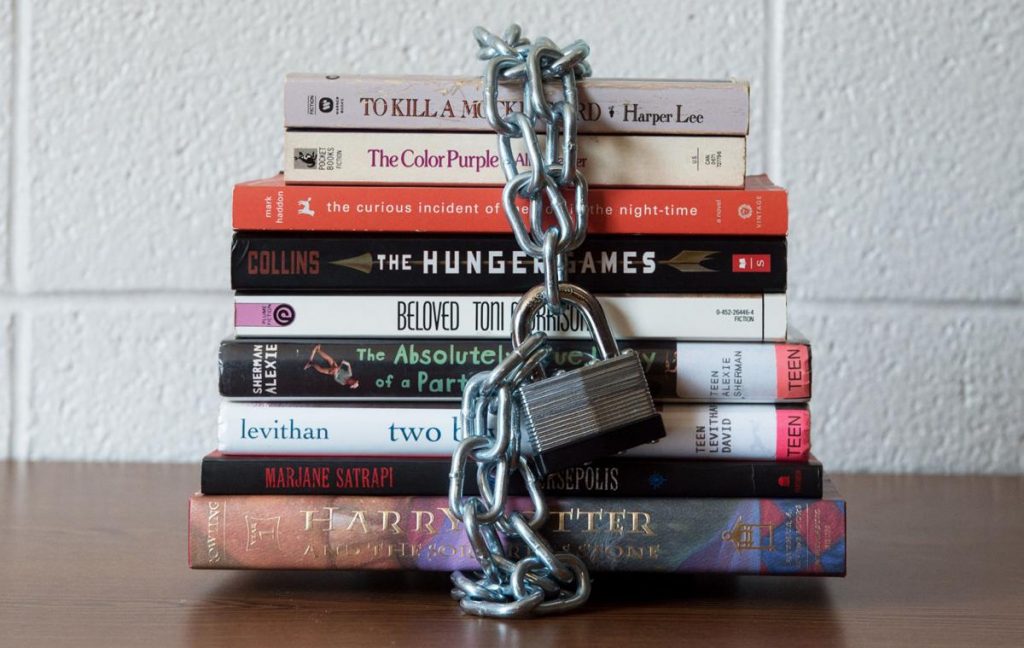 Image credit: Roger Nomer | The Joplin Globe
Image credit: Roger Nomer | The Joplin Globe
From Texas to Virginia to Pennsylvania, there is a growing movement to challenge books in schools that some suggest are inappropriate for students. Concern goes beyond explicit content; it now includes opposition to LGBTQIA material, the history of racism, and material that may cause discomfort to readers.
While efforts to ban books are not new, the solutions to counter censorship are—thanks to technology that is used to create access for all.
The Internet Archive’s Open Library (https://openlibrary.org) does not face the same local pressures that many school districts or school libraries do. At a time when students and teachers may be encountering limited access to content in their local community, the Internet Archive acquires and digitizes material for its online library, and lends a wide array of books for free to anyone, anytime.
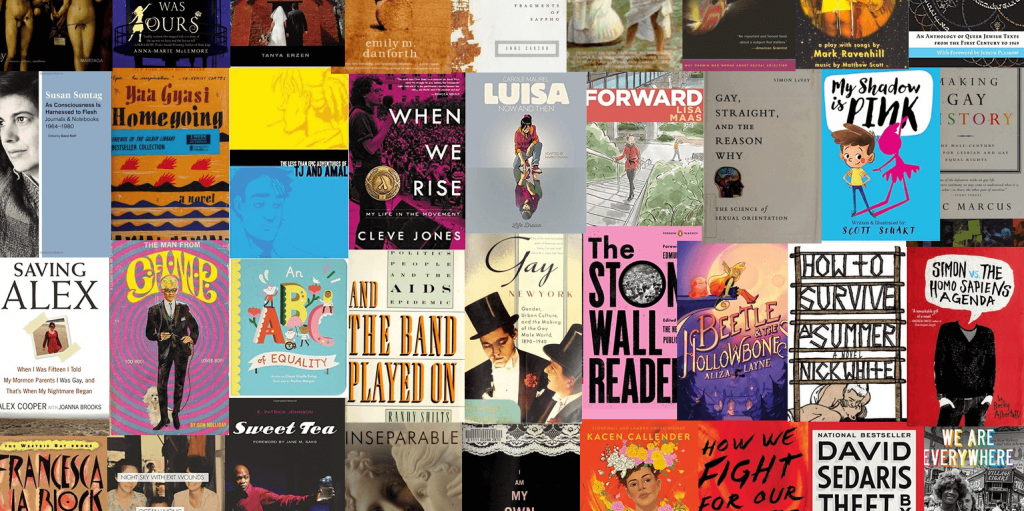 Browse Open Library’s LGBTQ Collection, one of the many curated collections available through Open Library.
Browse Open Library’s LGBTQ Collection, one of the many curated collections available through Open Library.
For example, the American Library Association’s list of most challenged books in the past decade are available in a curated collection. Among the titles: The Glass Castle by Jennette Walls, banned for offensive language and sexually explicit content; The Hunger Games by Suzanne Collins, cited as being insensitive, anti-family and violent; and Beyond Magenta: Transgender Teens Speak Out by Susan Kuklin, challenged for its LGBTQIA content and the perceived effects on young people who would read it.
Books dealing with gay and trans rights have long been targeted in school libraries. There are more than 1,800 titles in Open Library’s LGBTQ Collection—sorted, searchable and available to borrow online for free. Many of the novels, memoirs and works of history are not otherwise accessible to people who live in rural areas or places where those materials are explicitly banned.
New Challenges, New Responses
The new efforts to ban books are taking a much broader view of limiting access. Across the country, some objectors say books like Beloved by Toni Morrison, which was awarded the Pulitzer Prize for Fiction in 1988, should not be discussed or available in schools. As these lists are made public, Open Library’s volunteer team of Open Librarians take action to ensure that these books remain accessible to all.
Recently, Open Library created a collection of books removed from circulation in the Goddard School District in Kansas. It includes The Hate U Give by Angie Thomas and Fences by August Wilson, which was awarded the Pulitzer Prize for Drama in 1987. A small collection of banned books from Alaska’s Mat-Su Valley features Catch-22 by Joseph Heller and The Great Gatsby by F. Scott Fitgerald.
 View the collection of 850 books challenged in Texas.
View the collection of 850 books challenged in Texas.
Open Library’s lead community librarian, Lisa Seaberg, is curating a collection of 850 books that have recently been challenged in Texas. Among the books targeted are ones that mention human sexuality, sexually transmitted diseases, contain material that might make students feel uncomfortable or distressed because of their race or sex or convey that a student, by virtue of their race or sex, is inherently racist, sexist, or oppressive.
What’s become caught up in this “wide net,” said Seaberg, are books about health education, teen pregnancy, civics, philosophy, religion, anthropology, inventions, encyclopedias and, ironically, a novel about book censorship in a high school. Those who favor removing certain books see an opportunity and momentum, she said, but the difference in this moment is that libraries are able to provide access to titles regardless of where the reader is located.
One reason books get banned is because political forces within an area become stronger than the populace, said Mek, who leads the Open Library team for the Internet Archive. “Open Library is trying to bridge these inequity gaps across geographies and social classes. We invite the populace to come together and participate in a digital sanctuary where our rich and diverse cultural heritage isn’t subject to censorship by the few with special interests.”
“[T]here’s a difference between sharing an opinion and robbing someone of the opportunity to form their own.”
Mek, Open Library team leadAt the most basic level, banning books is about restricting access to knowledge, said Lisa Petrides, chief executive officer and founder of the Institute for the Study of Knowledge Management in Education (ISKME).
“The impact of this on schools means that students are exposed to a limited set of world views, which is extremely detrimental to critical thinking, reflective analysis and discussion,” said Petrides. “Perhaps even more importantly as we are seeing today, this means that educators and librarians are increasingly put in difficult situations, having to face the threat of reprisal from administrators or school boards, who are themselves increasingly less willing to stand up for the First Amendment rights of their teachers and learners.”
The Path Forward
Everyone’s perspectives should matter and be represented in the democratic process. A library must offer diverse materials so people can draw their own conclusions, said Mek. He embraces the oft-cited quote from librarian Jo Godwin: “A truly great library contains something in it to offend everyone.”
“It’s important for informed members of society to share their opinions,” he says. “But there’s a difference between sharing an opinion and robbing someone of the opportunity to form their own. To change hearts and minds, write a compelling book—don’t take authors you disagree with off the shelves. The Open Library community is honoring these values by giving contested titles their spots back on the shelf.”
Seaberg says, hopefully, recent book challenges will ultimately fail and access to a range of books will be restored. “If students walk into a library and they have books that only present one side of an issue, or are only relatable to a certain group in a culture, it excludes a lot of people,” she says. “They might not even know this other content exists.”
You can browse a full list of Open Library’s curated collections here. To volunteer for Open Library and help curate collections, please visit https://openlibrary.org/volunteer#librarian.
The post As Calls to Ban Books Intensify, Digital Librarians Offer Perspective appeared first on Internet Archive Blogs.
The Corruption of Copyright: New Scholarship in Libraries, Technology, and the Law
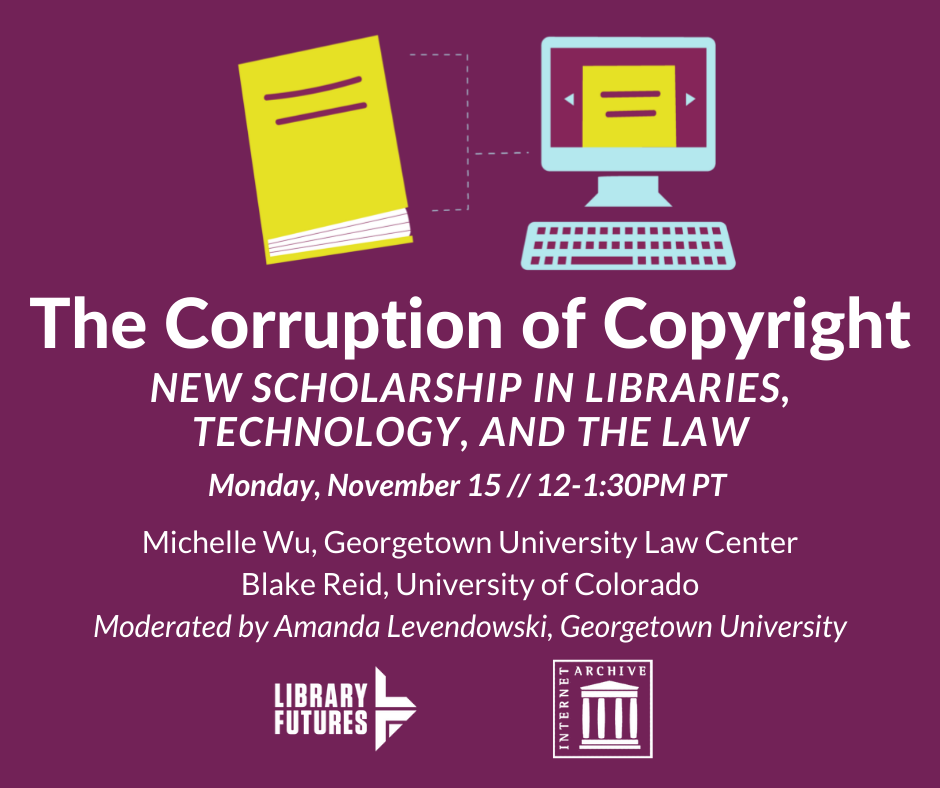
Join Library Futures, Internet Archive, and the Georgetown Intellectual Property and Information Policy (iPIP) Clinic for a panel on copyright, licensing, accessibility, and the law. We’ll be discussing new scholarship from legal experts Michelle Wu (retired Georgetown University Law Center) and Blake Reid (Clinical Professor at Colorado Law).
The Corruption of Copyright: New Scholarship in Libraries, Technology, & the Law
Monday, November 15
12pm PT / 3pm ET
Register now
Wu’s “The Corruption of Copyright and Returning to its Original Purposes” (Legal Reference Services Quarterly) looks at how some industries have redirected the benefits of copyright towards themselves through licensing and other activities, which impacts author remuneration and upsets the balance of the public interest. This paper focuses on the book, music, and entertainment industries, examines how copyright has been used to suppress the uses it was intended to foster, and explores ongoing and proposed avenues for course correction: https://scholarship.law.georgetown.edu/facpub/2410/
Reid’s “Copyright and Disability” (forthcoming in California Law Review) discusses how recent progress toward copyright limitations and exceptions continues an ableist tradition in the development of U.S. copyright policy: centering the interests of copyright holders, rather than those of readers, viewers, listeners, users, and authors with disabilities. Using case studies, Reid explores copyright’s ableist tradition to discuss how it subordinates the actual interests of people with disability. https://papers.ssrn.com/sol3/papers.cfm?abstract_id=3381201
The panel will be moderated by Amanda Levendowski, Associate Professor of Law at Georgetown Law.
The post The Corruption of Copyright: New Scholarship in Libraries, Technology, and the Law appeared first on Internet Archive Blogs.
Looking Back at the Million Book Project
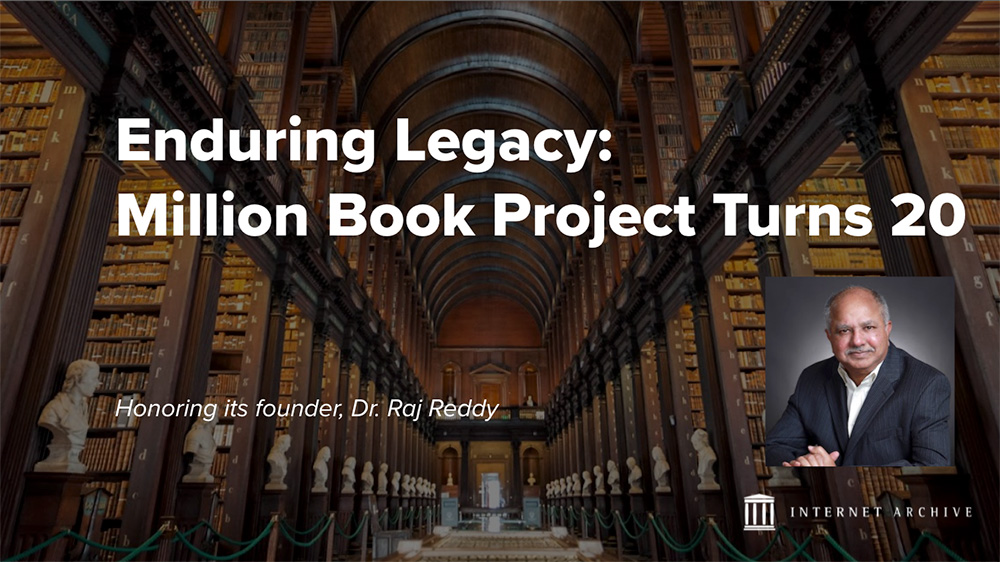
Years ago, many people rejected the idea of reading a book on a screen. Fortunately, others had a vision for the potential of digitizing the world’s knowledge.
One of those pioneers was Carnegie Mellon Professor Raj Reddy. The Internet Archive recently hosted a virtual event to honor him and celebrate the 20th anniversary of his Million Book Project that included Reddy, Vint Cerf of Google, Moriel Schottlender of the Wikimedia Foundation, Brewster Kahle of the Internet Archive, Mike Furlough of HaithiTrust, and Liz Ridolfo of the University of Toronto.
Since Reddy’s dream of providing universal access to all human knowledge—instantly to anyone, anywhere in the world—others have embraced the mission. Advocates of mass digitization discussed the tremendous impact that open access to creative works online has had on society, the challenges ahead, and potential, if more books are unleashed.
“There are tens of millions of digitized books available on the internet now. Many of these are born digital. Many more are being converted from print copies,” said Mike Furlough, executive director at HathiTrust, which has a collection of 17.5 million digital books. “This is really a human accomplishment that represents decades, if not centuries, of intellectual labor, physical labor to steward and preserve these items.”
Reddy said he knew his vision two decades ago was just the beginning and there is a huge amount of room to improve the utility of digital works. “It’s time for us to put our heads together to find a way to create digital libraries and archives that are far more useful than what we have today,” he said.
Many agreed more must be done to expand efforts, build a sustainable infrastructure and raise awareness of the shifting role of libraries to provide digital materials.
“I think we should ask more questions: What aren’t we digitizing? What are the economic or political forces that are constraining our choices and what corrective measures can we take?”
Mike Furlough, executive director, HathiTrustInternet Archive Founder Brewster Kahle said Reddy was right that bringing our full history online for the next generation is important, but it’s not been easy technically or institutionally.
“If we’ve ever wondered why you’d want digital books, the year 2020 told us why. The global pandemic hit and shut down school libraries, public libraries, and college libraries,” Kahle said. “We got calls from professors, teachers and homeschoolers, desperate to find some way in their Zoom classrooms to bring books to kids.”
The Internet Archive responded, explaining how libraries could extend access digitally to books that were in their physical collections. This helped make a big difference on the ground, and Kahle says policies are changing so libraries are confident in serving their digital learners. For instance, as libraries spend $12 billion a year on materials, Kahle said they should be able to purchase (not lease) e-books to fulfill their mission of service to users.
There was also a push among panelists for digitization to be more inclusive of works from all kinds of authors, recognizing what is being scanned is what’s already been obtained by libraries. “I think we should ask more questions: What aren’t we digitizing? What are the economic or political forces that are constraining our choices and what corrective measures can we take?” Furlough said.
The future interaction with knowledge involves the digitization of books and expanding the diversity of voices is critical, said Moriel Schottlender, principal system architect with the Wikimedia Foundation.
“Making resources available to anyone online is key and this is really what we’re striving for,” said Schottlender, noting Wikipedia’s mission is to be a beacon of factual information that is verifiable, neutral and transparent. “Our goal is that everyone in the world should be able to contribute to the sum of all knowledge. But not everyone has equal access to knowledge, to books, to journals, to libraries, to educational materials…We use digitization to increase equity.”
“Our goal is that everyone in the world should be able to contribute to the sum of all knowledge. But not everyone has equal access to knowledge…We use digitization to increase equity.”
Moriel Schottlender, principal system architect, Wikimedia FoundationThere is growing demand for all kinds of digital information, said Liz Ridolfo, special collections projects librarian at University of Toronto Libraries.. Donors want items digitized for a variety of reasons including to protect rare items, to reach a broader audience, and to free up physical space for other materials. Especially during the pandemic, Ridolfo said, it has been useful to have a curated collection of online teaching and reference materials.
Vint Cerf, vice president and internet evangelist at Google, said people are increasingly going online to get answers to questions—often turning to YouTube to view how-to videos. That demand for “just-in-time learning” is not a substitute for long-form content, he said, but it’s an interesting phenomenon that may draw people to the internet to learn more.
Looking ahead, Reddy said there is a need for big change to address the broken copyright law. His aspiration is that by 2031, there will be a frictionless, streamlined copyright regime, in which authors register for no fee, but can extend the copyright of a work indefinitely if they want by paying a prescribed fee. For users, he proposes access to copyright material for fair use in less than five minutes. They could pay a required fee, as prescribed by the data for a single copy use. If the copyright is not registered with the national digital library, then fines for copyright violations of unregistered copyright material should be nominal.
“Let’s take Raj’s vision here and make it come true,” Kahle said. “Who should argue against the streamline system where fair uses are easy. Where compensation is understood, where there’s registration and the actual copyrighted materials are in repositories that are long-term protected. Let’s just do this.”
The post Looking Back at the Million Book Project appeared first on Internet Archive Blogs.







































































































![Reference manager - [Onderhoud aantekeningen]](https://labyrinth.rienkjonker.nl/sites/default/files/styles/medium/public/Reference%20manager%20v3%20-%20%5BOnderhoud%20aantekeningen%5D%2014-2-2010%20102617_0.jpg?itok=OJkkWhxY)
![Reference manager - [Onderhoud aantekeningen]](https://labyrinth.rienkjonker.nl/sites/default/files/styles/medium/public/Reference%20manager%20v3%20-%20%5BOnderhoud%20aantekeningen%5D%2014-2-2010%20102628.jpg?itok=CUvhRRr7)
![Reference manager - [Onderhoud bronnen] - Opnemen en onderhouden](https://labyrinth.rienkjonker.nl/sites/default/files/styles/medium/public/Reference%20manager%20v3%20-%20%5BOnderhoud%20bronnen%5D%2014-2-2010%20102418.jpg?itok=d7rnOhhK)
![Reference manager - [Onderhoud bronnen]](https://labyrinth.rienkjonker.nl/sites/default/files/styles/medium/public/Reference%20manager%20v3%20-%20%5BOnderhoud%20bronnen%5D%2014-2-2010%20102433.jpg?itok=CgS8R6cS)
![Reference manager - [Onderhoud bronnen]](https://labyrinth.rienkjonker.nl/sites/default/files/styles/medium/public/Reference%20manager%20v3%20-%20%5BOnderhoud%20bronnen%5D%2014-2-2010%20102445_0.jpg?itok=4oJ07yFZ)
![Reference manager - [Onderhoud bronnen]](https://labyrinth.rienkjonker.nl/sites/default/files/styles/medium/public/Reference%20manager%20v3%20-%20%5BOnderhoud%20bronnen%5D%2014-2-2010%20102500.jpg?itok=ExHJRjAO)
![Reference manager - [Onderhoud bronnen]](https://labyrinth.rienkjonker.nl/sites/default/files/styles/medium/public/Reference%20manager%20v3%20-%20%5BOnderhoud%20bronnen%5D%2014-2-2010%20102524.jpg?itok=IeHaYl_M)
![Reference manager - [Onderhoud bronnen]](https://labyrinth.rienkjonker.nl/sites/default/files/styles/medium/public/Reference%20manager%20v3%20-%20%5BOnderhoud%20bronnen%5D%2014-2-2010%20102534.jpg?itok=cdKP4u3I)
![Reference manager - [Onderhoud thema's en rubrieken]](https://labyrinth.rienkjonker.nl/sites/default/files/styles/medium/public/Reference%20manager%20v3%20-%20%5BOnderhoud%20themas%20en%20rubrieken%5D%2020-9-2009%20185626.jpg?itok=zM5uJ2Sf)













![Reference manager - [Raadplegen aantekeningen]](https://labyrinth.rienkjonker.nl/sites/default/files/styles/medium/public/Reference%20manager%20v3%20-%20%5BRaadplegen%20aantekeningen%5D%2020-9-2009%20185612.jpg?itok=RnX2qguF)
![Reference manager - [Relatie termen (thesaurus)]](https://labyrinth.rienkjonker.nl/sites/default/files/styles/medium/public/Reference%20manager%20v3%20-%20%5BRelatie%20termen%20%28thesaurus%29%5D%2014-2-2010%20102751.jpg?itok=SmxubGMD)
![Reference manager - [Thesaurus raadplegen]](https://labyrinth.rienkjonker.nl/sites/default/files/styles/medium/public/Reference%20manager%20v3%20-%20%5BThesaurus%20raadplegen%5D%2014-2-2010%20102732.jpg?itok=FWvNcckL)
![Reference manager - [Zoek thema en rubrieken]](https://labyrinth.rienkjonker.nl/sites/default/files/styles/medium/public/Reference%20manager%20v3%20-%20%5BZoek%20thema%20en%20rubrieken%5D%2020-9-2009%20185546.jpg?itok=6sUOZbvL)
![Reference manager - [Onderhoud rubrieken]](https://labyrinth.rienkjonker.nl/sites/default/files/styles/medium/public/Reference%20manager%20v3%2020-9-2009%20185634.jpg?itok=oZ8RFfVI)

![Reference manager - [Onderhoud aantekeningen]](https://labyrinth.rienkjonker.nl/sites/default/files/styles/medium/public/Reference%20manager%20v3%20-%20%5BOnderhoud%20aantekeningen%5D%2014-2-2010%20102603.jpg?itok=XMMJmuWz)


































































